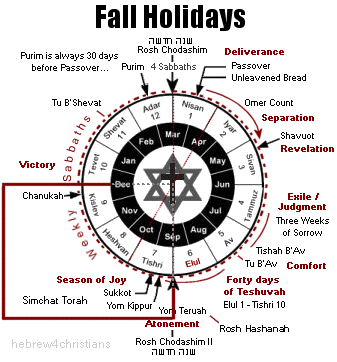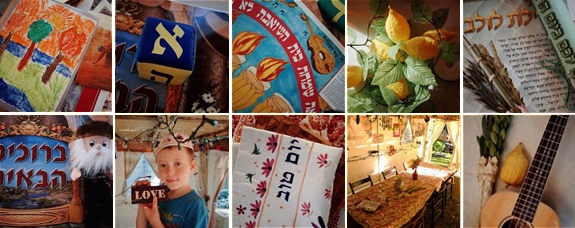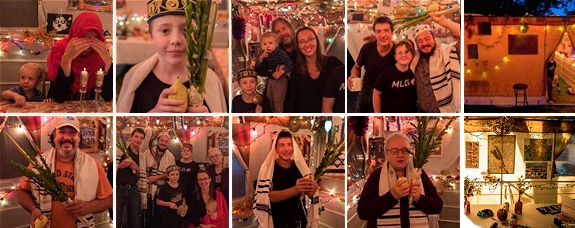|
Jewish Holiday Calendar
For October 2017 site updates, please scroll past this entry....
The Jewish civil year begins in the fall, though the Biblical year begins in spring (Exod. 12:2). Preparations for the fall holidays begin with a thirty day period of teshuvah (repentance) during the (late summer) month of Elul. The following ten days begin with the Feast of Trumpets (i.e., Rosh Hashanah, on Tishri 1) and end with the Day of Atonement (i.e., Yom Kippur, on Tishri 10). These first ten days of the new year are called the "Ten Days of Awe" (i.e., aseret ye'mei teshuvah: עֲשֶׁרֶת יְמֵי תְּשׁוּבָה), or simply the Jewish "High Holidays." Just five days after the solemn time of Yom Kippur begins the joyous week-long festival of Sukkot ("Tabernacles"), which is immediately followed by the celebration of Simchat Torah. The holiday of Chanukah occurs in late fall and carries over to the winter season:
The Fall Holidays:

The fall festivals prophetically indicate the Day of the LORD, the second coming of Yeshua, the great national turning of the Jewish people, and the establishment of the reign of the Messiah upon the earth during the Millennial Kingdom in the world to come.
Note that in accordance with tradition, holiday dates begin at sundown. Moreover, some holidays may be postponed one day if they happen to fall on the weekly Sabbath:
- Month of Elul (Mon., Aug. 21st [eve] - Wed. Sept. 20th [day])
- Month of Tishri (Wed. Sept. 20th [eve]) - Thur. Oct. 19th [day]
- Rosh Hashanah / Yom Teru'ah - Tishri 1 5778 (Wed. Sept. 20th) - Seder
- The Ten Days of Teshuvah: Wed. Sept 20th - Fri. Sept. 29th
- Shabbat Shuvah - the Shabbat that occurs during the Ten Days of Repentance between Rosh Hashanah and Yom Kippur (Fri., Sept. 22)
- Tzom Gedaliah - Sun. Sept. 24 (sunrise to sunset fast)
- Yom Kippur - Fri. Sept. 29th, a Sabbath (the fast begins an hour before sunset and runs 25 hours until after sunset Sat. Sept. 30th).
- Sukkot - Wed. Oct 4th at sundown through Wed. Oct. 11th at sundown.
- Hoshana Rabba - Climactic last day of Sukkot, Wed. Oct. 11th.
- Shemini Atzeret - The "eighth day" assembly after Sukkot. Thurs. Oct 12th.
- Simchat Torah - Celebration of the conclusion of the completion of the yearly Torah Reading Cycle. Thurs. Oct 12th - Friday Oct. 13th.
- Shabbat Bereshit - The beginning of the Torah Reading Cycle for the new year (Friday, Oct. 13th after sundown through the following Sabbath day).
- Month of Cheshvan (Thur. Oct. 19th [eve] - Sat. Nov. 18th [day])
- Five Sabbaths: Noach, Lekh-Lekha, Vayera, Chayei Sarah, Toldot
- Yom HaAliyah - a modern holiday established to acknowledge the contibution of olim (Jewish immigrants) to the Jewish state (Thur. Oct 26th; Cheshvan 7).
- Sigd - 50th day after Yom Kippur; Ethiopian Jewish holiday (Fri., Nov. 17th)
- Month of Kislev Sat. Nov. 18th [eve] - Sun. Dec. 17th [day])
- Four Sabbaths: Vayetzei, Vayishlach, Vayeshev, Miketz
- Dates for Chanukah 2017 (5778):
- 1st Chanukah candle - Tues. Dec. 12th [i.e., Kislev 25]
- 2nd Chanukah candle - Wed. Dec. 13th
- 3rd Chanukah candle: Thur. Dec. 14th
- 4th Chanukah candle: Fri. Dec. 15th
- 5th Chanukah candle: Sat. Dec. 16th
- Month of Tevet (Sun., Dec. 17th [eve] - Tues. Jan. 16th [day])
- Four Sabbaths: Vayigash, Vayechi, Shemot, Vaera
- Dates for Chanukah (continued):
- 6th Chanukah candle: Sun. Dec. 17th (Rosh Chodesh Chanukah)
- 7th Chanukah candle: Mon. Dec. 18th
- 8th Chanukah candle: Tues. Dec. 19th [Zot Chanukah]
- Winter Solstice: Wed. Dec. 20th (Kislev 20)
- Christmas: Sunday, Dec. 24th at sundown (Tevet 7)
- Tenth of Tevet - Thur. Dec. 28th; daytime fast over the seige of Jerusalem
- Secular New Year: Sun. Dec. 31st, 2018 (Tevet 14)
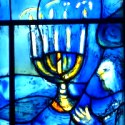 |
Note: Some calendars will list the first day of a holiday without indicating that the holiday actually begins sundown the night before... So, for example, while Chanukah begins Tuesday, Dec. 12th at sundown, some calendars may indicate that it occurs on the following day...
October 2017 Updates
Note: If any page content appears to be missing, please refresh the page...
God's Way of Deliverance...

[ The following entry is related to this week's Torah reading, parashat Vayera... ]
10.31.17 (Cheshvan 11, 5778) We read in our Torah portion this week, "Escape for your life. Do not look back..." (Gen. 19:17). You must turn away from what once defined you and never look back... This includes not only turning away from your former sins, but turning away from the guilt and shame of your sins... Living in the past, wallowing in your sin and regretting your mistakes, can cause you to feel worthless and even hopeless. If you feel compelled to revisit your former life, then be sure to do so before the foot of the cross, in light and presence of God's redemptive love for you. You can't change the past, but you can leave it behind by turning it over to God for healing. Teshuvah (repentance) means accepting who you are in light of God's love and salvation for your soul. "Brothers and sisters, I do not consider myself to have attained this, though I am single-minded: I forget the things that are behind and reach out for the things that are ahead ... heeding the upward call of God in Yeshua our Messiah" (Phil. 3:13-14). May you "find yourself in Him, not having a righteousness of your own that comes from the law, but that which comes through faith in Messiah, the righteousness from God that depends on faith" (Phil. 3:9).
Remember that God's way of deliverance is entirely different than man's way. Man tries to suppress the flesh, to cover it up, to justify its failings, or to enlist its power in the battle against sin (i.e., religion), but God's way is to remove the flesh from the equation. The goal is not to make us stronger and stronger, but rather weaker and weaker, until the flesh is "crucified" and only the sufficiency of the Messiah remains. Then we can truly say, "I have been crucified with Messiah. It is no longer I who live, but the Messiah who lives in me. And the life I now live in the flesh I live by faith in the Son of God, who loved me and gave himself for me" (Gal 2:20). The word "Hebrew" (עִבְרִי) means one who has "crossed over" (עָבַר) to the other side, as our father Abraham did (Gen. 14:13). It is on the other side of the cross that we experience the very power that created the universe "out of nothing" (i.e., yesh me'ayin: יֵשׁ מֵאַיִן) and that raised Yeshua the Messiah from the dead.
About Pagan Halloween...

10.31.17 (Cheshvan 11, 5778) Regarding those who regard pagan holiday of "Halloween" seriously, remember that there is no sorcery (i.e., nachash: נַחַשׁ) against Jacob, there is no divination (i.e., kesem: קֶסֶם) against Israel. At this time it must be said of Jacob and of Israel, 'Look at what God has done (מַה־פָּעַל אֵל)' [Num. 23:23]. No weapon formed against God's people shall prosper (Isa. 54:17), and the curse of the wicked is powerless against the tzaddikim (Prov. 26:2). Ein od milvado (אֵין עוֹד מִלְבַדּו) - God is the only true Power (Deut. 4:35; 1 Chron. 29:11; Rev. 4:11). Satan is an impostor and a foiled usurper. As Yeshua told his followers, "Behold I give to you authority to tread on serpents and scorpions and over all the power of the enemy, and nothing shall by any means hurt you" (Luke 10:19). Like Balaam and Haman, all who curse God's people or attempt to foil His plans will be upended... Amen.
Father of the faithful...

10.30.17 (Cheshvan 10, 5778) Abraham is the "father of all who believe" in the miracle of the Promised Seed (הזרע הבטיח), that is, in the Coming Deliver who would bring redemption and healing to the whole world (see Gal. 3:16; Rom. 4:1-5:1). The Torah states that God chose Abraham because he would faithfully teach his children to guard "the way of the LORD" (דֶּרֶךְ יְהוָה), by trusting in God's acts of "righteousness and justice" (צְדָקָה וּמִשְׁפָּט) that He would perform according to his promise (Gen. 18:19). God regarded Abraham as faithful to retain His promise, and therefore He would manifest salvation (יְשׁוּעָה) through his descendants. The "way of the LORD" refers to Yeshua, "the way and the truth and the life" (הַדֶּרֶךְ וְהָאֱמֶת וְהַחַיִּים), the Promised Seed that would crush the head of the serpent in the battle for our redemption. Abraham's faith was directed toward the Deliverer to come, as Yeshua said: "Abraham rejoiced to see my day; and he saw it and was glad" (John 8:56). Likewise we guard the way of the LORD as our father Abraham did – by trusting in God's promises given to us in Yeshua our Messiah.
Like Abraham we are chosen to embody the same heart, vision, and mission of Yeshua our LORD, to exist as "extensions of his presence" in this world, and therefore we are also called to walk uprightly, as he walked... Indeed, the Hebrew word derekh (דֶּרֶךְ), usually translated as "way," metaphorically refers to the journey, manner, or course of your life. Because God is tov v'yashar (good and upright), he teaches his children to be yesharim (יְשָׁרִים), i.e., those who walk uprightly. Indeed, the way of the LORD (דֶּרֶךְ יהוה) is "to do acts of charity and justice" (לַעֲשׂוֹת צְדָקָה וּמִשְׁפָּט) (Gen. 18:19). This is the "straight way" (derekh ha-yashar), or the "narrow path" that leads to life (Matt. 7:14).
טוֹב־וְיָשָׁר יְהוָה
עַל־כֵּן יוֹרֶה חַטָּאִים בַּדָּרֶךְ
tov · ve·ya·shar · Adonai
al · ken · yo·reh · cha·ta·im · ba·da·rekh


"Good and upright is the LORD
therefore will he teach sinners in the way."
(Psalm 25:8)
Note that the verbal clause "he will teach" (i.e., יוֹרֶה) used in this verse comes from the root yarah (ירה) -- the same root used in the word Torah (תּוֹרָה). Because the LORD is good and upright, He gives us Torah (direction) for our lives. God educates us for eternity by imparting to us moral and spiritual truth. As King David taught, "Happy is the man who delights in the Torah of the LORD and meditates upon it day and night" (Psalm 1:1-2).
Abraham and the Lamb...
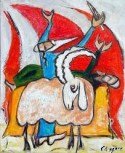
[ The following is related to our Torah reading for this week, parashat Vayera.... ]
10.30.17 (Cheshvan 10, 5778) The word "love" (אָהַב) first appears in the Torah regarding Abraham's passion for his son: "Take your son, your only son Isaac, whom you love, and go to the land of Moriah, and offer him there as a burnt offering on one of the mountains of which I shall tell you" (Gen. 22:2). After journeying to the place, Abraham bound Isaac, laid him upon an altar, and raised his knife to slay him. At the very last moment, the Angel of the Lord called out: "Abraham! Abraham! Do not lay your hand on the lad or do anything to him, for now I know that you fear God, seeing you have not withheld your son, your only son, from me" (Gen. 22:11-12). Abraham then "lifted up his eyes" and saw a ram "caught in a thicket" which he offered the place of his beloved son. Abraham named the altar Adonai-Yireh, "the LORD who provides" (Gen. 22:14). The sacrifice of the lamb for Isaac portrayed the sacrifice of Yeshua, the great 'Lamb of God' (שֵׂה הָאֱלהִים) who would offer up his life in exchange for the trusting sinner (John 1:29). Indeed the story of how God provided the lamb - both at Moriah and later during the Passover in Egypt - may be understood as the "Gospel according to Moses" (Luke 24:27; John 5:46).
Isaac not only pictures the sinner who trusts in God's sacrificial substitute, but also the One who offered himself in obedience to his heavenly Father. The Promised Seed illustrates how Yeshua "humbled himself by becoming obedient to the point of death, even death on a cross" (Phil. 2:7), and in that sense he is a type of Messiah. For instance, both Isaac and Yeshua were born miraculously; both were called "only begotten sons"; both were to be sacrificed by their fathers at Moriah; both experienced a "passion"; both willingly took up the means of his own execution; both were to be resurrected on the third day (Gen. 22:5, Heb. 11:17-19); and both demonstrate that one life can be sacrificed for another – the ram for Isaac, and Yeshua for all of mankind...
The first time the word "Torah" (תּוֹרָה) occurs in the Bible refers to the faith of Abraham (see Gen. 26:5), and the second time refers to the law of Passover: "There shall be one teaching (Torah) for the native and for the stranger" (Exod. 12:49). There is a link here. Abraham lived before the time of the Exodus, of course, and therefore he observed Passover by offering the lamb in place of his son (Gen. 26:5). Abraham revealed that the inner meaning of Torah is that the "righteous shall live by faith" (Hab. 2:4, Rom. 1:17) and that God justifies the sinner who trusts in him (Heb. 11:17-19; Rom. 4:5). During the Exodus from Egypt, Moses declared that the blood of the Passover lamb would be a "sign" of imputed righteousness secured by faith - with no "leaven," or human works, added. This is the "life-for-life" principle that underlies the sacrificial system of the Tabernacle revealed at Sinai as well. Ultimately all true Torah points to Yeshua, the Lamb of God (שֵׂה הָאֱלהִים), who died upon the cross for our offenses and was raised again for our justification (Rom. 4:25).
Elohim yireh-lo ha'seh le'olah b'ni: "God will provide Himself a Lamb for the burnt offering - my son..." The cross itself speaks to the question of "faith vs. works." At the time of the crucifixion of the Messiah, man was "shut out" because of the darkness and utter sanctity of the sacrifice of Yeshua as the Lamb of God who bore all the sins of the world... At the time of utmost darkness, man was on the "other side of the cloud," put into a "deep sleep" not unlike what Abraham had earlier experienced at the covenant of the parts (Gen. 15:12). Every human being stood helplessly on the other side of the cross; no one else participated to make us right with God: It was all Yeshua and the Father, and the Father and Yeshua alone... In that inner sanctum, that holy of holies, shammah! atonement was made.
Health Update: Dear friends, I have been sleeping most of the day because of a high fever that seems to be hanging on still.... Sadly, my whole family here has also contracted the flu as well, including baby Emanuel David. Thank you for your prayers for our speedy recovery!
Parashat Vayera - וירא

10.29.17 (Cheshvan 9, 5778) Our Torah reading for this week (Vayera) is very dramatic and extraordinarily prophetic. Among other things it includes what I have called the "Gospel according to Moses," or rather Moses' account of how Abraham was tested by God to offer his "only begotten son" (בֵּן יָחִיד) as a sacrifice on Mount Moriah -- the place of the future Temple. This famous story is referred to as the Akedah (עֲקֵדָה), or Akedat Yitzchak (עֲקֵידָת יִצְחָק) - the "binding of Isaac" (Gen. 22:1-18). At the very last moment, the Angel of the LORD stopped Abraham from going through with the sacrifice and provided a ram as a substitute. Abraham then named the location Adonai-Yireh (יהוה יִרְאֶה), "the LORD will provide/see" (from the 3p impf. of the verb ra'ah (רָאָה), "to see"). The binding of Isaac perfectly illustrates both the principle of sacrificial love and the principle that we must first unreservedly believe in that love in order to understand the ways of the LORD.
As Messianic believers, we understand the Akedah as a foreshadowing of the ultimate sacrifice the heavenly Father would give on our behalf. Unlike Abraham, God the Father actually offered His only begotten Son (בֵּן יָחִיד) Yeshua upon Moriah in order to make salvation available to all who believe (John 3:16-18; 1 John 4:9). As Abraham himself believed: אֱלהִים יִרְאֶה־לּוֹ הַשֶּׂה / Elohim yireh-lo haseh ("God Himself will provide a lamb").
אֱלהִים יִרְאֶה־לּוֹ הַשֶּׂה לְעלָה בְּנִי
E·lo·him · yir·eh-lo · has·seh · le·o·lah · be·ni

"God will see for himself the lamb for the burnt offering -- my son."
(Gen. 22:8)
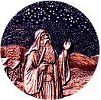
Indeed, the very first occurrence of the word love in the Scriptures (i.e., ahavah: אַהֲבָה) refers to Abraham's love for his "only" son who was to be sacrificed as a burnt offering on Moriah (the very place of the crucifixion of Yeshua), a clear reference to the gospel message (Gen. 22:2; John 3:16). Some scholars have noted that the word ahavah comes from a two-letter root (הב) with Aleph (א) as a modifier. The root means "to give" and the Aleph indicates agency: "I" give (i.e., the Father gives). Love is essentially an act of sacrificial giving... The quintessential passage of Scripture regarding love (αγαπη) in the life of a Christian is found 1 Corinthians 13: "Love seeks not its own..."
Whereas the Akedat Yitzchak foreshadowed God's provision for the coming Temple, the Akedat Yeshua (i.e., the crucifixion of Yeshua at Moriah) was the altar where the justice and chesed (love) of the Father fully met (Psalm 85:10). For more on this incredibly rich subject, please see the articles, "The Passion of Isaac" and "The Sacrificed Seed."
First Word of Revelation...
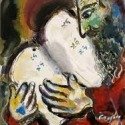
10.27.17 (Cheshvan 7, 5778) The Ten Commandments were given in the singular, not in the plural: "I AM the LORD your (singular) God" – to emphasize that each person must hear the message and receive it for themselves. Read and understand the statement: "I AM the LORD your God" (אָנכִי יְהוָה אֱלהֶיךָ) as the starting point of all Torah, the very first commandment, and the foundation for all that follows. Revelation begins with the apprehension of "I AM" for you – I AM your God who brings you out of slavery to your fear and your captivity to vanity. When you receive the Torah of "I AM the LORD your God," you are made a child of eternal promise, and even if heaven and earth should melt away in fervent heat, nothing can keep you from the care of your heavenly Father (Rom. 8:31-39). Perfect love casts out fear. Make yourself bold, then, to receive God's love for your soul. Abide in God's love; make it your own. Loving God is the beginning and end of all of reality.
Tending the Inner Flame...

10.27.17 (Cheshvan 7, 5778) Of our compassionate Savior Yeshua it is written: "A bruised reed shall he not break, and the smoking flax shall he not quench" (Isa. 42:3). People conscious of their frailty and who have been crushed because of it are likened to "bruised reeds" of whom the loving Messiah shall attend. As it is written, "The LORD is near to the brokenhearted and saves the crushed in spirit." Indeed, He binds up the broken of heart and gives liberty to those in bondage (Isa. 61:1). "A smoking flax shall he not quench" likewise means that our Lord will not snuff out an unsteady flame ready to expire, but will tend to it with special oil to cause it to burn more brightly...
Spirituality often enough involves a sense of irremediable brokenness, a feeling that you are not whole, that you are a mess, and that your need for God's healing is constant and relentless... Contrary to the ideals of proud humanism, spirituality is a state of "blessed neediness," of being "poor in spirit," that aches with inner desperation for God's power of healing. Those who humbly cry out to the LORD understand their great need for deliverance, "Woe is me, for I am ruined..." (Isa. 6:5). As Yeshua said, "Everyone who exalts himself will be humbled, but the one who humbles himself will be exalted" (Luke 18:14).
Shabbat shalom to you all, and especially to those of you who are of "unsteady flame..." May God pour out his oil upon you so that you can shine for him. Amen.
Escape from Egypt...
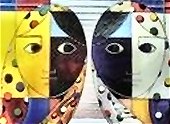
[ The following entry is related to this week's Torah reading, parashat Lekh-Lekha.... ]
10.27.17 (Cheshvan 7, 5778) Some time after entering the promised land, Abram's faith was tested: "Now there was a famine in the land, and Abram went down to Egypt to sojourn there..." (Gen. 12:10). The sages say that Abram stumbled by leaving the land, and that he should have trusted that the LORD would provide for him despite the lack of food. Indeed during his time in Egypt Abram lost sight of God, lied about Sarai, compromised his values, and was passive as his wife was abducted into Pharaoh's harem; the situation got so bad that God finally intervened by sending "great plagues" upon Pharaoh and his household to rescue the family from their captivity (Gen. 12:17). Because of these plagues, Pharaoh urged Abram to to make an "exodus" from the land, and Abram left with wealth acquired there (including Hagar, a daughter of Pharaoh). Humbled by his lapse of faith, Abram then returned to the altar he built near Bethel and called upon the LORD (Gen. 12:10-13:4). Note the parallels here with the later deliverance from Egypt under Moses. Indeed, during the "dark vision" Abram had at the "covenant of the parts" ritual, he foresaw that his experience with Pharaoh would be revisited in the lives of his children (Gen. 15:12-18). Even a great tzaddik like Abram had to learn obedience, as indeed did Messiah himself: "Although he was a son, he learned obedience through what he suffered" to become our great High Priest (Heb. 5:8-10). "Out of Egypt have I called my son..."
Abram's carnal excursion to Egypt resulted in the addition of Hagar to the family, and through her role as a "surrogate mother," to the advent of Abram's son Ishmael. Later the Apostle Paul associated the descendants of Hagar as "children of the flesh" in contrast to the descendants of Sarah who are "children of the promise." Ishmael's conception was "natural," i.e., was "of the flesh" and the result of human intervention and calculation; Isaac's conception, on the other hand, was supernatural and the result of God's direct intervention and design. Paul interprets these historical events in allegorical terms. The two mothers "represent" two distinct covenants: Hagar (the daughter of Pharaoh) represents the covenant made at Sinai that results in "children born for slavery," whereas Sarah represents the covenant made earlier based on divine promise that results in freeborn children (Gal. 4:24-27). Mount Sinai is in the barren wilderness -- the starting point of a nation that was once enslaved in Egypt; but Mount Zion/Jerusalem (representing the fulfilled promise) is in the "land flowing with milk and honey" -- the end point of a nation that was divinely chosen. Mount Sinai is ultimately barren, but Mount Zion is "the perfection of beauty" (Psalm 50:2) that bears innumerable children (Isa. 54:1). For more on this subject, see "The Allegory of Hagar and Sarah."
Hunger and Thirst...

10.27.17 (Cheshvan 7, 5778) From our Torah this week we read: "Now there was a famine in the land. So Abram went down to Egypt..." (Gen. 12:10). Some of the sages say this was a spiritual famine - "not a famine of bread, nor a thirst for water, but of hearing the words of the LORD" (Amos 8:11). Abram's community grew restless in the land, uncertain, and their hearts began to wander. Such was the "famine in the land." Abram then went down to Egypt (i.e., mitzraim: מִצְרַיִם, a place of metzar or restriction) to learn the need for God's salvation (i.e., yeshuah: יְשׁוּעָה, a word that means deliverance from restriction, that is, freedom and peace). As it is written: "From my distress (מִן־הַמֵּצַר), "my Egypt," I called to the LORD; the LORD answered me and set me in a wide open place" (Psalm 118:5). This further explains why after God delivered the family from Pharaoh, Abram returned to the altar at Bethel to worship the LORD (Gen. 13:3-4). Abram's return to the altar represents returning the house of God, to the blessing of salvation and the inheritance of freely serving God. "God is able to make all grace abound to you, so that having all sufficiency in all things at all times, you may abound in every good work" (2 Cor. 9:8).
Father of all who believe...
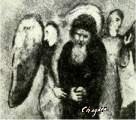
[ The following entry is related to this week's Torah reading, parashat Lekh-Lekha.... ]
10.27.17 (Cheshvan 7, 5778) Abraham is traditionally regarded as the first Jew, but understand that he began life as a "Gentile," the son of an idolater (Josh. 24:2), who later heard God's voice and then began his pilgrimage of faith into the realm of promise (Heb. 11:8-11). Moreover, God personally chose Abraham, promising to make him into a blessing, while he was not yet circumcised, and it was only later, after he sacrificed his beloved son Isaac (i.e., the Akedah) that he was promised that in his Seed (זֶרַע) shall all the nations of the earth be blessed (Gen. 22:18). It was the faith of Abraham - especially as demonstrated by the Akedah - that prefigured the justification of the nations through faith. This is the "Gospel of Moses" which Yeshua alluded (John 5:46). Therefore we read: "And the Scripture, foreseeing (προοράω) that God would justify the nations by faith, proclaimed the gospel beforehand to Abraham, saying, "In you shall all the nations be blessed" (Gal. 3:9). In other words, God's great plan of salvation was from the beginning for all the nations of the earth to be redeemed.
For more on this topic see the article, "The Father of all who believe..."
Justification by Faith...

[ The following entry is related to this week's Torah reading, parashat Lekh-Lekha.... ]
10.27.17 (Cheshvan 7, 5778) "And he believed in the LORD, and He counted it to him as righteousness" (Gen. 15:6). We are made right with God by trusting in his promises. The Talmud (Makkot 23b-24a) says, "Moses gave Israel 613 commandments, David reduced them to eleven (Psalm 15), Isaiah to six (Isaiah 33:15-16), Micah to three (Micah 6:8), Isaiah reduced them again to two (Isaiah 56:1); but it was Habakkuk who gave the one essential commandment: ve'tzaddik be'emunato yich'yeh (וְצַדִּיק בֶּאֱמוּנָתוֹ יִחְיֶה), literally, "the righteous one, by his trust, shall find life" (Hab. 2:4). The New Testament likewise distills the various commandments to the principle that we find life by trusting in God (see Rom. 1:17, Gal. 3:11, and Heb. 10:38). Spiritual life is the blessing of faith, since apart from faith we are spiritually dead and "powerless (ἀδύνατος) to please God" (Heb. 11:6). As King David said, "The LORD is near to all who call upon Him - to all who call upon Him in the truth" (Psalm 145:18). God is near to the honest soul who confesses the truth about his need, just as God distances himself from the proud and puffed up soul:
הִנֵּה עֻפְּלָה לא־יָשְׁרָה נַפְשׁוֹ בּוֹ
וְצַדִּיק בֶּאֱמוּנָתוֹ יִחְיֶה
hin·nei u·pe·lah lo ya·she·rah naf·sho bo
ve·tzad·dik be·e·mu·na·to yich·yeh

"Behold, his soul is puffed up; it is not upright within him,
but the righteous shall find life by means of his trust."
(Hab. 2:4)

Hebrew Study Card
Recall that the people of Israel were redeemed because they trusted in the promise of their deliverance, as it is written, "and the people believed (וַיַּאֲמֵן הָעָם) and bowed their heads" (Exod. 4:31). Faith is the essence of all true Torah from heaven, since apart from it no one can possibly find spiritual life (Heb. 11:6). This is why the first commandment is simply, "I AM the LORD thy God..." (Exod. 20:2). We start here, by trusting that the LORD is our God, since without that, nothing else follows.
The very purpose of creation is to know the love of the blessed Creator, and consequently whoever disregards or suppresses this truth fails to apprehend the essential reason for his or her existence. The meaning or message of reality itself is revealed and grounded in God's great love (1 John 4:8). Like the precious promises of a bridegroom to his beloved, the words of Scripture are to be kept in the "midst of the heart" where they serve as a source of life (Prov. 4:21-22).
Unforgotten in the Storm...
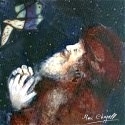
10.27.17 (Cheshvan 7, 5778) We usually can endure testing and hardship when we have a reason for our struggle, an answer to why we are being tested.... Is there anything worse than to feel forgotten by God, abandoned, even doomed? After being trapped inside the ark for so many months, tossed about in the midst of the roiling cataclysm and whirlwind of heaven, it must have seemed to Noah that God had altogether forgotten his promise to save him, but the Torah states, "God remembered Noah (וַיִּזְכּר אֱלהִים אֶת־נחַ) and all the animals that we were him in the ark" (Gen. 8:1). But why the long silence, especially in such time of grave peril? Why did God seemingly hide his face? Why, except to teach Noah patience and perseverance in the midst of the great storm. Noah is a model of tested faith, which, though it may struggle with feelings of being unseen and forgotten, in the end overcomes such fear to became an heir of righteousness that comes by faith (Heb. 11:7). So if you're in the midst of a storm with no end in sight, hang on - God is faithful and has not forgotten you....
"Suffering, failure, loneliness, sorrow, discouragement, and death will be part of your journey, but the Kingdom of God will conquer all these horrors. No evil can resist grace forever." - Brennan Manning
First Words to Abram...

[ The following entry is related to this week's Torah reading, parashat Lekh-Lekha.... ]
10.27.17 (Cheshvan 7, 5778) The very first time God spoke to Abram marked the beginning of the Jewish people, and the very first thing he said was lekh-lekha (לֶךְ־לְךָ), "go to yourself," by leaving behind what has previously defined your life, namely, 1) your land, 2) your relatives, and 3) your father's house (Gen. 12:1). Note that the order is reversed from what we might naturally expect, moving from the general to the specific, until ultimately we discern that we "go to ourselves" in order to leave ourselves behind... Only after this are we able to enter the land God will show us... As Yeshua said, "For whoever would save his life will lose it, but whoever loses his life for my sake will find it" (Matt. 16:25).
וַיּאמֶר יְהוָה אֶל־אַבְרָם
לֶךְ־לְךָ מֵאַרְצְךָ וּמִמּוֹלַדְתְּךָ וּמִבֵּית אָבִיךָ
אֶל־הָאָרֶץ אֲשֶׁר אַרְאֶךָּ
va·yo·mer · Adonai · el · Av·ram
lekh-le·kha · me·ar·tze·kha · u·mi·mo·lad·te·kha · u·mi·beit · a·vi·kha
el · ha·a·retz · a·sher · ar·e·ka

Now the LORD said to Abram:
"Go from your country and your kindred and your father's house
to the land that I will show you."

"Now the LORD said to Abram, 'Go... and I will make of you a great nation, and I will bless you and make your name great, and you will be a blessing" (Gen. 12:1-2). Note that the first letters of "and you will be a blessing" (i.e., וֶהְיֵה בְּרָכָה) are Vav + Hey (וה), which are the last two letters of the four-letter name YHVH (יהוה), and that signify "the Man (ו) of Spirit (ה)." The first two letters of YHVH spell Yah (יָהּ), referring to God, and the last two therefore refer to the Messiah, the Man of Spirit and Promised Seed. With the call of Abram, Vav + Hey would precede Yod + Hey, suggesting that Abram would serve as a conduit of the Divine Presence to the world. This is the deeper meaning of ve'heyeih berakhah ("and you will be a blessing"), since it meant Abram would be a direct forebear of the coming Messiah. This Hebrew wordplay also suggests that you will be a blessing, a person of Spirit (וה), when you put the LORD (יָהּ) first in your life...
The Meaning of "Hebrew"

[ The following entry is related to this week's Torah reading, parashat Lekh-Lekha.... ]
10.26.17 (Cheshvan 6, 5778) In parashat Lekh Lekha Abram is called ha-ivri (הָעִבְרִי) - "the Hebrew," a term that means "one who has crossed over" (עָבַר) from another place (Gen. 14:3). Rashi identifies this "other place" as Ur of the Chaldees (אוּר כַּשְׂדִים), located east of the Euphrates River, though the midrash (Genesis Rabbah) symbolically identifies it as the realm of idolatry: "The whole world stood on one side, but Abram crossed over to the other." Abram separated himself from a world steeped in idolatry and polytheism by worshiping the One LORD God who is the sole Creator of all things.... Understood in this way, being "Hebrew" means being regarded as an "other," a "stranger," or an "outsider" to idolatrous world culture. Similarly, all those who "cross over" from the realm of death to life because of Yeshua our Savior are rightly called "Hebrews" (John 5:24).
To Abram came to divine invitation: "Lekh-Lekha, go forth ... I will show you" (Gen. 12:1). It was only after Abram made the long journey to the unknown land of Canaan that God appeared to him to him by the Oaks of Mamre saying, "To your offspring I will give this land" (Gen. 18:1). Abram did not believe the promise because he saw God; he was only able to see God after he had walked in faith. First Abram heard the message, and later - after he acted on his faith - was he enabled to see more. This is the deeper meaning of being "Hebrew," one who crosses over from the realm of the dead to the realm of the Living God...
Therefore we note that hearing (shema) is more important than simply seeing... When we hear the truth and accept it into our understanding, it informs our perceptions, not the other way around. Truth is something revealed to the heart first, and only later to the senses.
The Name El Shaddai...
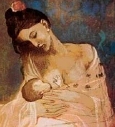
[ The following entry is related to this week's Torah reading, parashat Lekh-Lekha.... ]
10.26.17 (Cheshvan 6, 5778) When Abram was ninety-nine years old the LORD appeared to him and said, "I am El Shaddai (אֲנִי־אֵל שַׁדַּי); walk before me, and be made whole" (Gen. 17:1). Since the compound name "El Shaddai" depicts the image of a nursing mother (i.e., the word shadayim (שדיים) means "breasts," symbolizing sufficiency and nourishment, e.g., Gen. 49:25), perhaps this revelation was meant to remind Abram and Sarai that the LORD would be the Womb, the Sustenance, and the Substance of the coming promised Seed. Only God can bring life out of death - even life from the deadness of Sarai's womb (see Rom. 4:19). For this reason, both Sarai and Abram were renamed by adding the letter Hey (ה) to their original names, symbolizing the Holy Spirit of God. The promised Seed was to be born miraculously, not unlike the virgin birth of the Messiah reported in the Gospels (i.e., just as Sarai was "without a womb" yet enabled to bear the promised seed (of Isaac), so was Mary, a virgin who was enabled to bear God's promised Seed - the Messiah).
וַיּאמֶר אֵלָיו אֲנִי־אֵל שַׁדַּי
הִתְהַלֵּךְ לְפָנַי וֶהְיֵה תָמִים
vai·yo·mer · e·lav · a·ni · El · Shad·dai
hit·ha·lekh · le·fa·nai · ye·he·yeh · ta·mim

And He said to him: "I am El Shaddai,
walk before Me and be made whole" (Gen. 17:1)

In connection with the name El Shaddai (אֵל שַׁדַּי), we note that Abraham has more identifiable descendants than any other person in history... From the line of Isaac would come the twelve tribes of the Jewish people (as well as all those Gentiles who have been grafted into the covenantal blessings of Israel, i.e., the "church"), and from Ishmael would come the twelve tribes of the Ishmaelite people. Abraham also later married Keturah who bore him six more sons that became founders of six other nations of the Arab world, including the Midianites. To signify Abram's status, God changed his name from Avram ("exalted father" [from אָב, "father," + רָם, "exalted"]) to Avraham ("father of a multitude," a homonymic wordplay from אָב, "father" + המוֹן, "crowd"). Notice that some regard Avraham's name to mean "father of mercy" (from אָב, "father" + רחם, "womb").
Note: Most English translations render El Shaddai as "God Almighty," probably because the translators of the Septuagint (i.e., the ancient Greek translation of the Torah) thought that shaddai came from a root verb (shadad: שָׁדַד) that meant "to overpower" or "to destroy." The Latin Vulgate likewise translated shaddai as "Omnipotens," from which we get our English word "omnipotent." or "all-powerful." In other words, the translators regarded this term to suggest that God is so overpowering that He is considered "Almighty." For more on this topic, please see "God as El Shaddai."
Health Update: Thank you all for your prayers!!! My fever broke early this morning and the cough has subsided. I am feeling better, though I am still tired and sore. I praise God for you all and thank our glorious Lord for healing.
The Very First Priest...
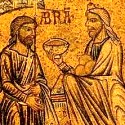
10.25.17 (Cheshvan 5, 5778) The Torah of Moses reveals that the very first "priest" (i.e., kohen: כּהֵן) was neither a Jew nor a Levite nor a descendant of Aaron, but rather Someone who is said to have "neither beginning of days nor end of life" but is made like (ἀφωμοιωμένος) the Son of God, a priest continually (Heb. 7:3). This priest, of course, was Malki-Tzedek (מַלְכִּי־צֶדֶק), the King of Salem (מֶלֶךְ שָׁלֵם) to whom Abraham offered tithes after his victory over the kings (Gen. 14:18). The author of the Book of Hebrews makes the point that the priesthood of Malki-Tzedek is greater than the Levitical priesthood and is therefore superior to the rites and services of the Tabernacle (Heb. 7:9-11). It was to Malki-Tzedek that Abram (and by extension, the Levitical system instituted by his descendant Moses) gave tithes and homage -- and rightly so, since Yeshua is the great High Priest of the better covenant based on better promises (Heb. 8:6).
For more on this subject, see the article, "Exploring the Identity of Malki-Tzedek."
Health Update: Dear friends, please keep me in your prayers. I have a high fever (103-104 Fahrenheit) that - despite alternating between Ibuprofen and acetaminophen) is not going down. I also have excruciating body aches, and if I cough I can't stop for awhile, which triggers serious breathing problems for me (and that causes the children to get frightened). We don't have normal insurance for hospital visits, so I am praying to be spared seeing a doctor at this point... Thank you for your kind thoughts, well-wishes, and prayers.
The Hidden Palace...
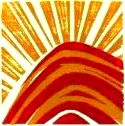
[ The following entry is related to this week's Torah reading, parashat Lekh-Lekha.... ]
10.25.17 (Cheshvan 5, 5778) The midrash says Abraham first encountered God by contemplating nature, likening it to a brilliantly lit palace that must have an owner. As he considered nature's wonder, a voice called out saying, "I am the owner of this palace..." The sages discuss the various preoccupations that commonly distract us from similarly detecting God's presence in nature for ourselves. Rabbi Shlomo asked, "God's greatness is inestimable; the entire cosmos is but a mustard seed when compared to him. How can so small a world block out so tremendous a God?" When we seek the truth of God, the eyes of faith will detect the "hidden palace," and everything around us will seem miraculous.
קָדוֹשׁ קָדוֹשׁ קָדוֹשׁ יהוה צְבָאוֹת
מְלא כָל־הָאָרֶץ כְּבוֹדוֹ
ka·dosh ka·dosh ka·dosh, Adonai Tze·va·ot,
me·lo khol ha·a·retz ke·vo·do

"Holy, holy, holy is the LORD of hosts;
the whole earth is full of his glory!"
(Isa. 6:3)

Download Study Card
"For his invisible attributes (τὰ γὰρ ἀόρατα αὐτοῦ), namely, his eternal power and divine nature, have been clearly perceived, ever since the creation of the world, in the things that have been made..." (Rom. 1:20). "For by him (King Messiah) all things were created, in heaven and on earth, visible and invisible, whether thrones or dominions or rulers or authorities -- all things were created through him and for him" (Col. 1:16). "To the King of the ages, immortal, invisible, the only God ( μόνῳ σοφῷ θεῷ), be honor and glory forever and ever" (1 Tim. 1:17). "He (Moses) endured as seeing him who is invisible" (Heb. 11:27). "We look not to the things that are seen but to the things that are unseen. For the things that are seen are transient, but the things that are unseen are eternal (2 Cor. 4:18).
Moses "endured as seeing Him who is invisible." It is this "as seeing Him" that is the essence of faith -- seeing God's hand and presence through the throes of temptation, stormy clouds, pain, and darkness. Faith never gives the last word to despair....
Hidden Life in God...

10.25.17 (Cheshvan 5, 5778) It is said that the tzaddikim (righteous ones) are "doubly called" by God: "Abraham, Abraham" (Gen. 22:11), "Jacob, Jacob" (Gen. 46:2), "Moses, Moses" (Exod. 3:4), "Samuel, Samuel" (1 Sam. 3:10), "Saul, Saul" (Acts 9:4), and so on, to indicate that the LORD calls once to each soul in this world (olam hazeh) but a second time to each soul who will in the world to come (olam haba) by means of his grace... When God told Abram to "get out of your land," he called him to focus on heavenly places – to find his identity there. "Seek ye first the kingdom of God..." (Matt. 6:33). Thus David says, "I shall walk before the LORD in the land of the living" (Psalm 116:9), which means all his deeds would be done for the sake of heaven. The earth then becomes the "land of the living," or "the land that I will show you," as Abram was told (Gen. 12:1). Likewise, followers of Yeshua no longer find their identity in this world but rather through their spiritual union with the resurrected LORD (Gal. 2:20; 6:14; Eph. 1:3; 2:6)... Therefore we are told to "seek the things that are above (τὰ ἄνω ζητεῖτε) where the Messiah is seated at the right hand of God; focus your thoughts on the things above - not on things here on earth - for you have died, and your life has been hidden (κέκρυπται) with Messiah in God. Then when the Messiah, who is your life, appears, you too will appear with him in glory" (Col. 3:1-4).
So have you heard the "upward call of God in Yeshua the Messiah" (Phil. 3:14)? This "upward call" (τῆς ἄνω κλήσεως) is the invitation from above, the sound of the heavenly Voice, beckoning you to enter the "high country" of the world to come. As Yeshua said, "I am from above (ἐγὼ ἐκ τῶν ἄνω)." Our true identity is not found in this world and its vain philosophy. The cross brings these things to an end, as we "cross over" from the realm of the dead to the realm of life (Gal. 6:14). Can you say: "I have been crucified with Messiah. It is no longer I who live, but Messiah who lives in me. And the life I now live in the flesh I live by faith in the Son of God, who loved me and gave himself for me" (Gal. 2:20)?
The great commandment is always Shema - listen - and heed God's Voice: "And your ears shall hear a word behind you, saying, "This is the way, walk in it," when you turn to the right or when you turn to the left (Isa. 30:21). At any given moment of our day, then, we can attune ourselves to hear the "upward call" and come "boldly before the Throne of Grace" (Heb. 4:16). The world knows nothing of this realm and is enslaved by appearances and the delusions of this realm, olam hazeh. As Yeshua said, "To you it has been given to know the mysteries of the kingdom of heaven, but to them it has not been given" (Matt. 13:11). The Spirit always says, "Come, my people, enter your chambers, and shut your doors behind you" (Isa. 26:20). The LORD beckons: "Call to me and I will answer you, and will tell you great and hidden things that you have not known" (Jer. 33:3). And I looked, and behold, a door standing open in heaven! And the first voice, which I had heard speaking to me like a trumpet, said, "Come up here, and I will show you..." (Rev 4:1). The repeated or "double call" of heaven is the voice of love. The Beloved calls out to the beloved: "Arise, my love, my beautiful one, and come away" (Song 2:10, 2:13).
וְאָזְנֶיךָ תִּשְׁמַעְנָה דָבָר מֵאַחֲרֶיךָ לֵאמר
זֶה הַדֶּרֶךְ לְכוּ בוֹ
כִּי תַאֲמִינוּ וְכִי תַשְׂמְאִילוּ
ve·oz·ne·kha · tish·ma·nah · da·var · me·a·cha·re·kha · le·mor:
zeh · ha·de·rekh · le·khu · vo
ki · ta·a·mi·nu · ve·khi · tas·me·i·lu

"Your ears will hear a word behind you saying:
'This is the way; follow it,'
when you turn to the right or to the left."
(Isa. 30:21)

Personal note: The last two days I've been running a very high fever and can barely get out of bed. I also have a very painful cough. Thank you for your prayers for my recovery.
Heart of Righteousness...
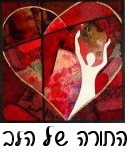
10.23.17 (Cheshvan 3, 5778) From our Torah reading for this week (Lekh-Lekha) we learn about the resolute faith of Abram who, despite his old age, trusted that God would make his descendants as numerous as the stars in the night sky: "And the LORD brought him outside and said, "Look toward heaven and count the stars, if you are able to number them." Then the LORD said to him, "So shall your offspring be. And he trusted in the LORD, and He reckoned it to him for righteousness" (Gen. 15:6). Abram "staggered not" at the promise of God, and therefore God imputed to him righteousness (צְדָקָה), a term understood here to be divine esteem and grace. After all, what could Abram do in the face of seeming impossibility? There was nothing he could do to effect the miracle. The New Testament comments: "He did not weaken in faith when he considered his own body, which was as good as dead (since he was about a hundred years old), or when he considered the barrenness of Sarah's womb" (Rom. 4:19). It was in a state of utter powerlessness and complete helplessness that Abram retained hope and thereby received the promise by faith. "For he was beyond hope, yet in hope he trusted that he would indeed become a father to many nations, in keeping with what he had been promised, 'so shall your offspring be'" (Rom. 4:18).
Understand that 400 years before the law was given at Sinai, the LORD regarded the faith of Abram as the heart of the righteousness later prescribed by the law. Therefore the very First Commandment of the Decalogue is simply: Anochi Adonai Elohekha (אָנכִי יְהוָה אֱלהֶיךָ): "I AM the LORD your God" (Exod. 20:2), which repeats the call to trust God before everything else, since it is complete surrender to the love and grace of God that justifies us, as it is written: "to the one who does not work but trusts in the One who justifies the ungodly (i.e. the helpless), his faith is counted as righteousness" (Rom. 4:5).
Where the LORD says "Look toward heaven and count the stars, if you are able to number them," we note the Hebrew word "count" (סָפַר) may also mean "recount," "interpret," or explain... This is the same word used in the famous verse, "The heavens declare (מְסַפְּרִים) the glory of God" (Psalm 19:1). The idea here would be not merely that Abram would have lots of descendants, but they would shine in brilliance against the backdrop of the darkness. Abram's children would be lights upon the earth, declaring the truth of God and enlightening the darkness of mankind. "And those who are wise shall shine like the brightness of the sky above; and those who turn many to righteousness, like the stars forever and ever" (Dan. 12:3). In the same way, "let your light shine before others, so that they may see your good works and give glory to your Father who is in heaven" (Matt. 5:16; 13:43).
Righteousness and Faith...
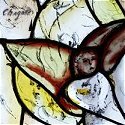
10.23.17 (Cheshvan 3, 5778) Our Torah portion this week (Lekh-Lekha) describes how Abram was declared righteous because he trusted in God's promise for his life. The Hebrew word emunah (אֱמוּנָה), often rendered as "faith" in many English translations, comes from the root word aman (אָמַן), which means to rest securely or rely upon (and from which we also get the word "amen"). The root occurs for the first time in the Torah in connection with Abraham: "And he believed (וְהֶאֱמִן) in the LORD, and He regarded it to him as righteousness" (Gen. 15:6). But what was the nature of Abraham's faith that caused God to regard it as tzedakah (צְדָקָה) or "righteousness"? What was the "object" or "content" of his faith? Was it not that Abram knew the character and will of God so intimately that he unconditionally put his trust in Him? Abraham was declared tzaddik (righteous) because he believed and understood that the LORD would fulfill His promise to him, despite his advanced age and the seeming impossibility of becoming the father of a multitude of nations, as it is written: "No unbelief made him waver concerning the promise of God, but he grew strong in his faith as he gave glory to God, fully convinced that God was able to do what he had promised. That is why his faith was "counted to him as righteousness" (Rom. 4:20-22). In effect, Abraham affirmed God's promise by saying the first "amen."
Now while emunah has an intellectual aspect that understands God's attributes and character, it certainly goes beyond mere intellectual apprehension and assent (i.e., the idea of believing certain ideas or doctrines), since the "object" of faith is the Person of the Living God Himself. Therefore it is not inaccurate to say that emunah is more "belief in" than "belief that." The root word (aman) later appears when the Torah describes how Moses' arms were "steadied" by Aaron and Chur during the battle against Amalek (Exod. 17:12). Genuine faith is a settled conviction (ἔλεγχος) that what God has promised will indeed come to pass (Heb. 11:1). It accepts that God's verbal promise of our future good is entirely reliable and sure - regardless of the present circumstances (it is telling, is it not, that Abram's faith was tested when God asked him to sacrifice his son Isaac on the altar; the obedience of Abram went beyond the evidence, or rather persisted in spite of contrary evidence, and yet remained steadfast). Abraham believed in a future state of affairs (a future-tense proposition) as expressed in his present faith in the Person and Promise of God. He foresaw the redemption of the world (the Messiah) and understood God's promise of salvation (John 8:56).
Note: For more on this subject, see the article, "Emunah and Bittachon."
Crossing Over to Life...

[ The following is related to this week's Torah reading, parashat Lekh-Lekha... ]
10.23.17 (Cheshvan 3, 5778) Our Torah portion this week begins: "Now the LORD said to Abram, "Go (לֶךְ־לְךָ) from your country and your kindred and your father's house to the land I will show you" (Gen. 12:1). The Book of Hebrews comments, "By faith Abraham obeyed when he was called to go out to a place that he was to receive as an inheritance, and he went out, not knowing where he was going... for he was looking forward to the city that has foundations, whose designer and builder is God" (Heb. 11:8,10). The Sefat Emet says that every person of faith is likewise commanded daily to "lekh-lekha," to "go for yourself" by crossing over from the world and its deadening habits to live as an exile with God. Paradoxically, we find ourselves when we lose ourselves - when we leave behind the labels, roles, and identities this world foists upon us and instead resolve to seek the promise of God's Kingdom. As Yeshua said, "For whoever would save his life will lose it, but whoever loses his life for my sake will find it" (Matt. 16:25).
Note: In a sefer Torah (i.e., a handwritten Torah scroll), Hebrew words are written without vowels, so "lekh lekha" (לך־לך), often translated as "go forth," could be read as "go, go!" - emphasizing the importance of the mitzvah: Get moving! Start walking! Begin your journey!
The Call of Abraham...

10.22.17 (Cheshvan 2, 5778) Last week's Torah portion (i.e., parashat Noach) introduced us to Abram (אַבְרָם), the descendant of Noah's son Shem, who was the great-grandson of the patriarch Methuselah - a man who who personally knew Adam and Eve and upheld the original promise of redemption given in the Garden of Eden. Just as there were ten generations from Adam to Noah, so there were also ten generations from Noah to Abram (see Gen. 11:10-32). And just as Noah became the father of 70 nations, so Abram (through Shem) would become the father of the Jewish people, through whom the Promised Seed - the Messiah and Savior of the world - would eventually come.
In our Torah portion this week (Lekh-Lekha), we read that Abram was 75 years old, married to (his half-sister) Sarai, and guardian of his nephew Lot (his deceased brother Haran's son) when he received the promise of divine inheritance: "And the LORD said to Abram, "Go from (i.e., lekh-lekha: לך־לך) your country and your kindred and your father's house to the land that I will show you. In Hebrew, the phrase lekh lekha means "go for yourself" (lit. "walk [הָלַךְ] for yourself [לְךָ]"), though it can be interpreted it to mean "go to yourself," that is, "look within yourself" in order to begin walking out your own journey into the promises. The realm of divine promise is only attained when we venture out in faith. Like our father Abraham, we are called to "cross over," leave everything behind, and take hold of God's glorious promise for our lives.
 |
Personal note: I have been out of town the last few days seeing my mother, who was recently hospitalized for serious health concerns.... Your prayers for her are deeply appreciated.
Torah of the Vine...

10.20.17 (Tishri 30, 5778) The Word of God speaks: "If anyone does not live in Me, he is cast off as a branch, and withers..." (John 15:6). We find life only as we remain connected to the Source and Conduit of life, who is the Messiah, the Savior and LORD. True life grows out a heart connection with Yeshua, and without that connection our lives become vain and yield no eternal significance (John 15:5). Be forewarned: it is the truth of the Messiah that if you do not live in the Vine you will be destroyed, since life is found in no other Source (John 14:6; Luke 3:9). Be encouraged, trusting friend: the yoke of Messiah is easy, and His burden is light: we cannot create new life by our own efforts nor effect regeneration by means of our own "good works." No, the work of salvation is God's alone, and we partake of that work as we abandon our self-efforts and religious conceits (see Isa. 32:17). There remains, therefore, a Sabbath for the people of God, "for whoever has entered God's rest has also rested from his works as God did from his" (Heb. 4:9-10). This "deep Sabbath" of rest is a matter of trusting that the finished work of salvation has been given on your behalf. Therefore "strive to enter into that rest," for the LORD always effects what is best for you, and nothing is under your control anyway. The path of peace is to surrender to God's care for your life and let the evils and drama of the world flow past you. This is "the work of faith." Look to heavenly reality and not to the vanity and deceits of this world (Col. 3:1-4). Live in Yeshua's Presence, drawing strength and vitality from your relationship with Him. The conditional statement, "If you live in Me and my words live in you" (John 15:7), means that we will know His heart as we heed the message of his truth (i.e., his word) within our hearts.. The fruit of the Holy Spirit is produced as we yield ourselves to the love and presence of God.
וְהָיָה מַעֲשֵׂה הַצְּדָקָה שָׁלוֹם
וַעֲבדַת הַצְּדָקָה הַשְׁקֵט
וָבֶטַח עַד־עוֹלָם
ve·ha·yah · ma·a·seh · ha·tze·da·kah · sha·lom
va·a·vo·dat · ha·tze·da·kah · hash·ket
va·ve·tach · ad · o·lam

"And the work of the Righteousness One shall be peace;
and the service of the Righteousness One shall be quietness
and assurance for ever." - Isa. 32:17
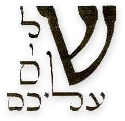
Hebrew Study Card
The "Torah of the Vine" (תּוֹרַת הַּגֶּפֶּן) further teaches us that "every branch that bears fruit will be pruned so that it may bear more fruit" (John 15:2). Note first that it is the healthy branch that will be cut back - not the withered one that will be altogether removed – and this purging process may be painful at times. The heavenly Vinedresser's goal is for the fruitful branch to yield more fruit, to reveal more and more the connection to the Heart of the Vine, so that God is glorified (see John 15:8). The end here is the beatific vision: "Blessed are the pure in heart, for they shall see God" (Matt. 5:8). Note that the Greek word translated "pure" is katharos (καθαρός), sometimes used describe the cleansing of a wound (catharsis), or to describe the unalloyed quality of a substance revealed through refining fire. Sanctification involves "catharisis" of the ego – the exile of carnal desire, the frustration of our will, the release of truth in the inward parts. A faith that thinks God will make us immune to suffering, challenges, and tribulation is an immature and imperfect faith, friends. The goal of "purging" is fruitfulness and blessing, but the agency is not the will of man but the power of God. You are made "clean" through the word of God spoken within your own heart (John 15:3). Your sanctification, however, depends on your communion with God, staying connected to what is real, central, vital, the core truth of God's Presence and love, the ultimate Reality of Life itself.
For more on this, see "The Torah of the Vine: Living in the Divine Connection."
Heart of Reality…

10.20.17 (Tishri 30, 5778) The Scriptures teach us that the most essential truth about life, the "core" of Reality, the very essence of Being itself, is not something objective to be studied (a "what") but Someone intimately to be known (a "Who"), experienced by the revelation of the Heart of God, the Divine Love that is willing to be wounded, to suffer, and even to die for your sake so that you may know that you are beloved, chosen, and treasured of heaven... There are innumerable attributes, names, and titles ascribed to the LORD God in Scripture, but His essence is described as Love itself (1 John 4:16). Indeed, God's heart is the beginning, middle, and end of Reality (אֱמֶת), but if your theology somehow leads you away from this all-encompassing and great truth, you've missed the point of it all...
Note: We are traveling to visit my ailing mother this weekend. Your prayers for our travels are deeply appreciated, friends. Shabbat Shalom and Chodesh Tov!
Irrepressible Creation...

10.20.17 (Tishri 30, 5778) The cosmological dogma that the universe somehow was caused by an enormous (and yet inexplicable) explosion several billions of years ago (i.e., the "big bang") is routinely accepted by people today, though such a theory cannot explain what caused the big bang itself, nor can it explainwhy is there something rather than nothing at all... Moreover, whereas scientific cosmology "omnisciently" claims that the universe came into existence without a discernible reason, that is, groundlessly or without rational warrant, it is somehow considered "irrational" to believe that a personal and transcendental Power created the world for the sake of revealing the divine love and glory to mankind. In light of this, it is helpful to remember that genuine science involves observation and measurement, and whenever cosmologists extrapolate beyond empirical evidence to explain the origin of the universe, they are creating a myth or a model that is every bit as religious as those who believe God created the universe yesh me'ayin, "out of nothing."
הַשָּׁמַיִם מְסַפְּרִים כְּבוֹד־אֵל
וּמַעֲשֵׂה יָדָיו מַגִּיד הָרָקִיעַ
יוֹם לְיוֹם יַבִּיעַ אמֶר
וְלַיְלָה לְּלַיְלָה יְחַוֶּה־דָּעַת
ha-sha·ma·yim · me·sa·pe·rim · ke·vod · El,
u·ma·a·seh · ya·dav · mag·gid · ha·ra·ki·a;
yom · le·yom · ya·bi·a · o·mer,
ve·lai·la · le·lai·la · ye·cha·veh · da·at

"The heavens recount the glory of God,
and the sky above proclaims the work of His hands.
Day after day it speaks out;
night after night it reveals His greatness."
(Psalm 19:1-2)

Download Study Card
Simple logic reveals that the universe had a beginning, since it is impossible to traverse an infinite number of moments to arrive at a present moment... Since the universe is indeed present, therefore it necessarily had a beginning. The question of the origin of the universe therefore leads to "inference to the best explanation." On the assumption that the Torah is true, what would we expect to see in light of human history and its values, of good and evil, of love, beauty and truth, and so on... The objections raised to a personal Creator and King are moral more than they are intellectual. It is a matter of the will, not of the evidence itself. There is plenty of "junk science" in the world today that purports to substantiate godlessness. The LORD is revealed intuitively within each human soul, and the impression of the Divine nature is indelibly written on the human heart. As it is written, "God's eternal power and divine nature from the creation of the world are understood through what has been made, so people are without excuse" (Rom 1:20).
If the devil can't kill you, he will try to make you insane... He will lie to you about who you really are... He will harass you and vex your soul; he will whisper fearful things in your ear... He will make what is small seem big and what is big seem small. He will raise dark suspicion within your soul, causing you to draw back in worry. He will remind you of your sins to make you feel ashamed, dirty, and unwelcome. He will hiss that you are unlovable and unworthy. He will argue on behalf of your flesh that you deserve better than this... He will tempt you to seek relief in cisterns of emptiness and futility. Most of all, he will try to cast a spell to make you forget that you are truly a prince or princess of God Almighty... The devil seeks to drive you into the exile of loneliness and despair. Resist him in the Name of the LORD!
Da lifnei mi attah omed: "Know before whom you stand!" As Elisha said to his servant Gehazi, "Do not be afraid, for those who are with us are more than those who are with them" (2 Kings 6:16). We are surrounded by an innumerable multitude of angels, with the LORD of Hosts who rules over all. Ask the LORD God Almighty to give you the "strategic advantage" over the enemy -- for you to see his wiles, but not for him to see you.... Ask God for the armor of light that blinds eyes accustomed to darkness (Rom. 13:12). How else can we fight this archenemy of our souls? We cannot fight "fire with fire," but we can appeal to the One who fills heaven and earth "with horses and chariots of fire all around" (2 Kings 6:17). "Kadosh, kadosh, kadosh, Adonai Tzeva'ot" (Holy, holy, holy is the LORD of the armies of heaven); "melo khol ha-aretz kevodo" (the whole earth is filled with His glory" (Isa. 6:3).
Torah of the Ark...
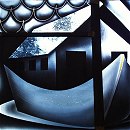
[ The following entry concerns this week's Torah reading, parashat Noach... ]
10.19.17 (Tishri 29, 5778) In our Torah portion for this week (i.e., parashat Noach) we note that Hebrew word translated "ark" is teivah (תֵּבָה), a word that first occurs to name the huge box-shaped vessel that Noah, his family, and the animals entered to escape the judgment of the great flood (Gen. 6:14), though later the word occurs to name to the small vessel ("basket") that Moses' mother made to hide her son among the reeds of the Nile river to escape the wrath of Pharaoh: "And when she (Yocheved) could hide him no longer, she took for him a basket (i.e., teivah) made of reeds (תֵּבַת גּמֶא) and daubed it with bitumen and pitch. She put the child in it and placed it among the reeds by the river bank" (Exod. 2:3). In both cases, however, we note that what distinguishes a "teivah" (i.e., ark) from a boat or ship (אֳנִיָּה) is the absence of a sail or rudder: there is no way to control its direction, speed, or destination. Spiritually understood, then, an "ark" represents a vessel completely surrendered to God's care, and the "Torah of the Ark" (תּוֹרַת הַתֵּבָה) teaches that we must cast ourselves upon the waters of the Father's great mercy (אֲבִי הָרַחֲמִים) and completely trust that He will guide our passage through the storms of this life (1 Pet. 5:7).
Note: A more common Hebrew word often translated "ark" is aron (אֲרוֹן), a term that means a "chest" (i.e., the Ark of the Covenant) or even a "coffin" (Gen. 50:26).
Communion in Truth...
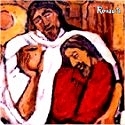
10.19.17 (Tishri 29, 5778) "If you live in me, and my words live in you, you may ask whatever you wish, and it will be done for you" (John 15:7). Note then the connection between living in union with Yeshua – that is, receiving divine life through faith in God's love – and the words of the Messiah that are made alive within you. The Word of God living within you is the inner awareness and expression of your communion with the truth and reality of God. It is the voice of your redeemed and regenerated self (your godly nature) speaking in harmony with the Holy Spirit. If you truly live in this communion, your heart's petition will be fulfilled, because you will become one with Yeshua's heart, vision, message, and passion. "And this is the confidence that we have before him: that whenever we ask anything according to his will, he hears us" (1 John 5:14). God hears us because He hears the language of truth, just as the heart of heaven is expressed only in the language of truth.
The Primacy of Truth...

10.19.17 (Tishri 29, 5778) In Hebrew, the word for "truth," i.e., emet (אֱמֶת), contains the first, middle, and the last letter of the Hebrew alphabet, indicating that truth encompasses all things and endures from the beginning (א) to the end (ת). The sages sometimes say "the seal of God is truth," since the final letters of the three words that conclude the account of creation, namely, bara Elohim la'asot ("God created to do" [Gen. 2:3]), spell the word emet. The word for falsehood, on the other hand, is sheker (שֶׁקֶר), composed of letters near the end of the alphabet, suggesting instability, impermanence, and distance from God. Indeed the letter Aleph represents the preeminent and ineffable glory of God, but if we remove Aleph from the word emet, we are left with the word "dead" (i.e., met: מֵת), the opposite of life (i.e., chayim: חַיִּים). Therefore, if we attempt to ignore or suppress God in our understanding of truth, we end up with death. And since Yeshua told us, "I am the way (הַדֶּרֶךְ), the truth (הָאֱמֶת), and the life (הַחַיִּים); no one comes to Father apart from me" (John 14:6), those who deny His reality are in a state of spiritual death.
אָנכִי הַדֶּרֶךְ וְהָאֱמֶת וְהַחַיִּים
וְאִישׁ לא־יָבא אֶל־הָאָב בִּלְתִּי עַל־יָדִי
a·no·khi · ha·de·rekh · ve·ha·e·met · ve·ha·chai·yim
ve'ish · lo · ya·vo · el · ha·av · bil·ti · al · ya·di

"I am the way, and the truth, and the life.
No one comes to the Father apart from my hand."
(John 14:6)
Hebrew Study Card
Of the thirteen attributes revealed to Moses that defined the Name י־ה־ו־ה (Exod. 34:6-7), two are joined together. The LORD is rav chesed ve-emet (רַב־חֶסֶד וֶאֱמֶת), abundant in lovingkindness and truth, indicating that his love is always the Center of Reality... In other words, just as God's Name means "Presence" and "Breath," it also means "Compassion," "Love," "Life," and "Faithfulness." As Yeshua testified: "I AM Aleph and Tav, the beginning and the ending," says the LORD God (יְהוָה אֱלהִים), "the One Who is, and Who was, and Who is to come (הַהוֶה וְהָיָה וְיָבוֹא), the LORD of Hosts" (Rev. 1:8).
It's been said that the ancient Greek mindset regarded what is beautiful as what is good, whereas the Hebraic mindset regarded what is good as what is beautiful. The difference is radical. Doing our duty before God, in other words, is what is truly beautiful, not merely appreciating the appearance of symmetry, order, balance, and so on. This explains why moral discipline (i.e., musar, מוּסָר) is so prominent in Hebrew wisdom literature. In the spiritual sense, beauty cannot exist apart from moral truth, and moral truth cannot exist apart from "doing the truth" through acts of righteousness...
Progressive Judgments...

[ The following entry concerns this week's Torah reading, parashat Noach... ]
10.18.17 (Tishri 28, 5778) God is patient and longsuffering, and therefore his judgment comes in progressive stages. The Great Flood was preceded by four successive generations of prophets that warned of the coming cataclysmic judgment: Enoch, Methuselah, Lamech, and finally Noah. It is fascinating to understand that Adam himself was alive when Noah's grandfather Methuselah was born, so the original message of teshuvah (repentance) was an echo that came from Eden itself; moreover, consider that Abraham personally knew of Noah (Abraham was 58 years old when Noah died), and undoubtedly Noah's son Shem told him of his grandfather Lamech, who had seen and spoken with Adam who was directly created by God alone. Later, Abraham's son Isaac also came to know Shem, Noah's firstborn son, and the legacy of the "gospel of the garden" was thereby passed on...
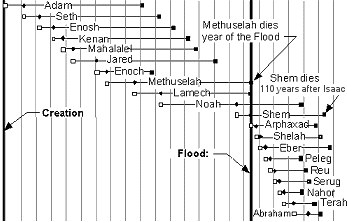 |
The first stage was the abandonment of the inherent dignity of others as people created in the image and likeness of God. This negation of the divine characteristics of people led to sexual promiscuity that became rampant upon the earth: "The sons of God saw the daughters of man that they were fair, and they took for themselves wives, whomsoever they chose" (one midrash claims that the Dor HaMabul, the generation of the flood, would regularly exchange marital partners). God then gave mankind 120 years to repent from his sexual corruption or be faced with apocalyptic destruction (Gen. 6:3). Despite Noah's 120 year public building project and the preaching of his grandfather Methuselah, God's patience finally ran out (1 Pet. 3:20). God then "saw that the wickedness of man was great in the earth and that every imagination of the thoughts of his heart was only evil continually" (Gen. 6:5). Mankind refused to repent and turn to God....
There is a tragic progression at work here. The practice of "casual" acts of lawlessness eventually led to the acceptance and practice of sexual promiscuity. This, in turn, resulted in the loss of mankind's sanctity (kedushah), since this comes from man's ability to subordinate his instinctual/emotional desires to his intellectual/spiritual life. Genuine sanctity refuses to exploit others as means to an end. Disregarding this truth cheapens and impairs the sense of self, causing disintegration of the spiritual life. As humanity became more and more fractured and stupefied, God's "like for like" judgment resulted in "giving them over" (paradidomi) to the lusts of their hearts (Rom. 1:26). (In our culture of unbridled pornographic expression and sexual immorality, we mirror such an antediluvian world view. Indeed, it is a mark of our age to be enamored with "degrading passions," with gender confusion and regularly practiced idolatry (i.e., fornication, adultery, homosexual relationships, and so on)). The final verdict of this practiced chamas (lawlessness) was the bestowal of a "depraved mind" (αδοκιμον νουν), a condition of being unable to reason properly at all. Since truth is essentially grounded in a sense of value, and value is a function of conscience, a depraved mind is literally insane from a spiritual perspective... People who are devoid of conscience are unable to reason along the lines of ethical truth at all. This promoted a cultural collusion to suppress the truth, to silence the truth-tellers, to kill the prophets, and to gag advocates for justice. Lawlessness squelches the inward voice of right and wrong within the human heart.
Note: For more on this topic, see "The Days of Noah."
Are you known by God?

10.18.17 (Tishri 28, 5778) Yeshua somberly warned those who professed faith: "Not everyone who says to me, 'Lord, Lord,' (אֲדנִי אֲדנִי) will enter the kingdom of heaven, but the one who does the will of my Father who is in heaven. On that day many will say to me, 'Lord, Lord, did we not prophesy in your name, and cast out demons in your name, and do many mighty works in your name?' And then will I declare to them, 'I never knew you; depart from me, you workers of lawlessness'" (Matt. 7:21-23). Despite the practice and profession of their faith, these people were strangers to God... They had a false sense of assurance, believing that they were "serving God" while they really were not... So the essential question here is whether Yeshua truly knows you. You may know something about God, religion, or "spirituality," and yet you may remain unknown by him... So where are you finding life? What are you loving? Where are you going?
"MANY will say to me in that day, Lord, Lord, have we not prophesied in thy name? and in thy name have cast out demons? and in thy name done many wonderful works?" From this we infer that good works - even those done "in the name of Messiah" - are insufficient for life, and that something more is needed... Yea, even Yeshua's sacrifice on the cross can't bring you into relationship with him apart from personally receiving it for your healing... By faith you must encounter Yeshua clothed in your flesh, bearing your sin, and suffering death for you; otherwise you remain "outside" of Messiah, in a place of exile and loss....
"And then will I declare to them, 'I never knew you; depart from me, you workers of lawlessness' (Matt. 7:23). Of course the Sovereign LORD knows all things, including the devious ways of the lawless (the word "lawless" [ἀνομία] refers to those who contemptuously spurn or "dismiss" the truth of Torah), so here we need to understand this "knowledge" as a personal heart connection, an inward trust, and an ongoing intimate communion with the LORD. It is written in Scripture, "The LORD knows the way of the righteous (כִּי־יוֹדֵעַ יְהוָה דֶּרֶךְ צַדִּיקִים), but the way of the wicked ends in destruction" (Psalm 1:6). As Yeshua said, "My sheep hear my voice, and I know them, and they follow me. I give them eternal life, and they will never perish..." (John 10:28-19). Notice that the deciding factor turns on whether you are in relationship with Messiah: "This is the work of God, to trust in the One whom God has sent [for you]" (John 6:28-29). This is the will of the Father, the true Torah of the LORD, namely, to honor the Messiah and believe in his salvation... This is the work of faith. You trust him for eternal life, you believe that he bears your sins, you seek to know his heart, and you desire to share your life with him. It is lawlessness to reject the Torah of the LORD that commands us to follow Messiah and know him in all our ways - including the ways of our struggles, our fears, and so on. Each of us must wrestle alone, in the dark places of fear, to find our new name from God (Gen. 32:24). Is the blessing for you or not? The essential thing is to know (and more importantly) to be known by Yeshua...
Heart of Wisdom...

10.17.17 (Tishri 27, 5778) The bloom of every flower is decreed by eternal purpose, and not one common sparrow is forgotten by your Heavenly Father (Luke 12:6). God's irresistible providence comprehends and orders all things, from the realm of the subatomic to the cosmic motions of the heavenly bodies. The Lord is the Center of reality: "All things were created by Him, and for Him, and in Him all things hold together" (Col. 1:16-17). In light of this overarching glory, Blaise Pascal asked, "What is left for us but to unite our will to that of God himself, to will in him, with him, and for him the thing that he has eternally willed in us and for us." The Mishnah says it this way: "Do His will as if it was your will that He may do your will as if it was His will" (Avot 2:4). In other words, what else can we do but learn to trust, accept, and to say "yes" to life – even if at times we may feel like strangers in exile... All our days are ordained; recorded in God's scroll. Therefore may God "teach us to number our days to get a heart of wisdom" (Psalm 90:12). So don't lose heart, friend; He who cares for you is a good shepherd, and you shall dwell in the house of the LORD forever.
לִמְנוֹת יָמֵינוּ כֵּן הוֹדַע
וְנָבִא לְבַב חָכְמָה
lim·not · ya·me·nu · ken · ho·da
ve·na·vi · le·vav · chokh·mah

"Teach us to number our days
that we may get a heart of wisdom."
(Psalm 90:12)

Hebrew Study Card
Moses prayed to God: "teach us to number our days," that is, help us understand how to make our days count for eternity, to have a weight of glory that will shine in the world to come... The sages say on the day of death, one considers one's life as if it had been a single day... Life goes by so quickly, and we never know when our personal Rosh Hashanah will come. "No one knows the day or hour..." That's why it is so vital to be healed and to turn to God while there is still time. So turn to him today and bacharta ba'chayim – "choose life!"
Despite the frailty and brevity of our days, may it please God to shine the power of His radiance upon us and to establish our works for His praise. May He help us to "number our days" so that we may obtain levav chokhmah (לְבַב חָכְמָה) - a heart of wisdom to live according to His will (James 1:5). Amen.
Seeing the Invisible...

[ The following entry concerns this week's Torah reading, parashat Noach... ]
10.17.17 (Tishri 27, 5778) Just as the patriarch Noah foresaw the great cataclysm to come, so we are to understand that the world above our heads and under our feet is likewise destined to destruction, as we also await the promised world to come. As it is written in our Scriptures: "Lift up your eyes to the heavens, and look at the earth beneath; for the heavens vanish like smoke, the earth will wear out like a garment, and they who dwell in it will die in like manner; but my salvation will be forever (וישׁוּעָתִי לְעוֹלָם תִּהְיֶה), and my righteousness will never be dismayed" (Isa. 51:6).
This idea is repeated in the New Testament: "For as were the days of Noah, so will be the coming of the Son of Man" (Matt. 24:37). "But the Day of the LORD will come like a thief, and then the heavens will pass away with a roar, and the heavenly bodies will be burned up and dissolved, and the earth and the works that are done on it will be exposed. Since all these things are thus to be dissolved, what sort of people ought you to be in lives of holiness and godliness, waiting for and hastening the coming of the Day of God, because of which the heavens will be set on fire and dissolved, and the heavenly bodies will melt as they burn? But according to his promise we are waiting for new heavens and a new earth in which righteousness dwells. Therefore, beloved, since you are waiting for these, be diligent to be found by him without spot or blemish and at peace" (2 Pet. 3:10-14).
In light of all this, we choose to look not to the things that are seen but to the things that are unseen. "For the things that are seen are transient, but the things that are unseen are eternal... For the invisible things of Him from the creation of the world are clearly seen, being understood by the things that are made, even his eternal power and Godhead. Therefore we are strangers and exiles on the earth, looking forward to the city that has foundations, whose designer and builder is God" (2 Cor. 4:18; Rom. 1:20; Heb. 11:10,13).
Faith sees the invisible... Our father Abraham was promised descendants as numerous as the stars in the sky or sand on the seashore, despite the fact that he was an old man and his wife had long past the age of bearing children. Abraham believed in the One who gives life to the dead and calls into existence the things that do not exist: "He staggered not at the promise of God through unbelief but was strong in faith, giving glory to God; and being fully persuaded that, what He had promised, He was able also to perform: And therefore it was imputed to him for righteousness" (Rom. 4:19-22). Faith in God trusts in an unseen good, apprehends a future and a hope, and refuses to allow this world to have the last word of what is ultimately real. May you walk by faith, and not by sight, chaverim...
Noah and Yeshua...

[ The following entry concerns this week's Torah reading, parashat Noach... ]
10.17.17 (Tishri 27, 5778) We understand Noah to foreshadow the greater deliverance of Yeshua, the Savior of the world (i.e., moshia ha'olam: מוֹשִׁיעַ הָעוֹלָם). Of Noah it was said that he was ish tzaddik (a righteous man) who was tamim (blameless) in his generation: et-ha'Elohim hithalekh-noach - "Noah walked with God" (Gen. 6:9). Likewise Yeshua was entirely tzaddik (Rom. 5:19, Heb. 4:15, 1 Pet. 3:18; 1 John 2:1), blameless (Heb. 4:15, 1 Pet. 3:18), and One who walked with God (John 5:19, John 8:28, etc.). And just as Noah's obedience to God saved a remnant from all the earth, so did Yeshua's obedience result in "the saving of his house" (Heb. 11:7). Moreover, just as God "blessed Noah and his sons" (Gen. 9:1) and with them established His covenant, so in greater measure is this fulfilled in the Person of Yeshua, who provides all spiritual blessings to those whom He calls his brethren (Eph. 1:3, Heb. 13:20; Heb 2:11). Yeshua is indeed the "righteous man" who saves us in the true teivah (ark), the shelter of God's grace.
Noah's ark had God Himself as its designer (Gen. 6:14-16), and salvation in Yeshua is by God's design (Jonah 2:9; Eph. 1:9, 1:11). Noah's ark contained only one door (Gen. 6:16), just as Yeshua is the only door to salvation (John 10:9). Noah's ark contained three levels (Gen. 6:16) and salvation has three own experiential levels (2 Cor. 1:10): past, present, and future. In the past (at Moriah) Yeshua delivered us from the penalty of sin; in the present, He is delivering us from the power of sin; and in the future He will deliver us from the very presence of sin. From Noah's hand was given the sign of the dove, a symbol of peace and the abiding presence of the Spirit of God...
For more on this subject, see "Noah and Jesus: Further thoughts on parashat Noach."
As the Days of Noah...

10.16.17 (Tishri 26, 5778) "For as were the Days of Noah (ימֵי נחַ), so will be the coming of the Son of Man. For as in those days before the flood they were eating and drinking, marrying and giving in marriage, until the day when Noah entered the ark, and they were unaware until the flood came and swept them all away" (Matt. 24:38-9). Yeshua told us that the "Days of Noah" were marked by people who were asleep, blind, and unaware (ἔγνωσαν, "agnostic") of spiritual truth. They lived their days oblivious to Reality. They "forgot" who God was, who they were, why they existed, and where they were going. They engaged in deception, violence, theft, and rampant promiscuity. Such is our world today...
The deadening effects of sin leads to moral and spiritual blindness that leads to corruption and unthinking brutality and violence. Of Noah's generation it was written that "the whole earth was corrupt before God, and filled with violence" (Gen. 6:11). Rashi understood the word "corruption" (shachat) to primarily refer to sexual immorality (i.e., idolatry) and "violence" (chamas) to primarily refer to theft and robbery. In general, however, the sages regarded the word chamas to refer to lawlessness, that is the denial of Torah, and consequently the benighted condition of living without yirat ha-shamayim (awe of heaven). When people are spiritually dead, they are unconscious of the wonder of God; oblivious to what is real; and they are consequently debased into mere animals...
Parashat Noach (פרשת נח)

[ The following entry concerns this week's Torah reading, parashat Noach... ]
10.15.17 (Tishri 25, 5778) Last week's Torah portion (Bereshit) showed how the mutiny of Adam and Eve caused humanity to plunge into idolatrous chaos. The subsequent generations lost sight of the LORD and became progressively steeped in moral anarchy and bloodlust, so that "every intention of the thoughts of man's heart was only evil continually" (Gen. 6:5). After just nine generations, the LORD had grown so weary of humanity that he "regretted" (i.e., yinchem: יִּנָּחֶם) creating man and "his heart was grieved" (Gen. 6:6). However, God recognized Noach (from the godly line of Seth) as a tzaddik (צַדִּיק), a righteous man of faith, and graciously made provision to save him from the wrath to come....
Noah's father Lamech (לֶמֶךְ, "powerful one") regarded his son as a deliverer who would comfort humanity from the ravages of the original curse (Gen. 5:29). Noach would give rest (נוּחַ) from the toil and vexation of life. Indeed, Noah was a "type" of the Savior to come who would rebirth the world by giving lasting comfort and rest (for more on this, see the page "Noah and Jesus"). In like manner it was prophesied that Yeshua would give us everlasting rest: "His rest shall be glorious" (Isa. 11:10), just as He offers rest to the weary (Matt. 11:28, Heb. 4:9). His sacrifice on the Cross at Moriah undoes the kelalah (curse of work) over the children of Adam. Indeed, His life, sacrifice, and resurrection was like a "magic spell" that "spoke backwards" the sin of the "First Adam" - and by means of His deliverance the power of the curse is forever broken (see Gal. 3:13, John 3:14, 2 Tim.1:10; Heb. 2:14; Heb. 9:27-28; 1 John 3:8, Rev. 22:3). Yeshua is Adam ha-Sheni - the "Second Adam" - the promised Son of Man. By means of His Spirit we are given an everlasting comfort (John 14:16).
Eschatologically, the "days of Noah" present a picture of the idolatrous conditions of the world that will prevail just before the calling up of the followers of Yeshua before the time of Great Tribulation upon the earth: "As were the days of Noah, so will be the coming of the Son of Man" (Matt. 24:37). The generation of the Flood was said to be "filled with violence" (Gen. 6:13) caused by ignorance -- literally the "state of ignoring" moral and spiritual truth. Because people willingly disregarded God from their midst, they arrogated to themselves divine prerogatives: "every man did what was right in his own eyes." The resulting moral corruption and anarchy led to divine and catastrophic judgment: when God destroyed them with water, they return the world to its original state of tohu vavohu v'choshekh: "confusion and emptiness and darkness" (Gen. 1:2). This is our world today.
The seven day warning given to Noah suggests the seven year tribulation period to come (Daniel's 70th week), and also the "rapture" of the people of God who will be carried above the prophesied worldwide cataclysm. Just as God protected Israel during the time of judgment upon Egypt, so He will protect His people from the wrath of the "great Day of the LORD." But please note that "the LORD shut him in" (Gen. 7:16). Noah's teivah (ark) had God Himself as its designer (Gen. 6:15f), just as salvation in Messiah is by God's design (Jonah 2:9; Eph. 1:9, 1:11). It contained only one door (Gen. 6:16), just as Yeshua is the only door to salvation (John 10:9; 14:6). Noah's ark contained three levels (Gen. 6:16) and salvation has three own experiential levels (2 Cor. 1:10): past, present, and future. In the past (at Moriah) Yeshua delivered us from the penalty of sin; in the present, He is delivering us from the power of sin; and in the future He will deliver us from the very presence of sin. Baruch Hashem - may that day come soon!
Calendar Note: On the Biblical calendar, the month of Cheshvan (חֶשְׁוָן) immediately follows the "holiday month" of Tishri, and begins Friday, October 21st (at sundown) this year. The Torah records that God brought down the Great Flood that destroyed the world on Cheshvan 17 (Gen. 7:10-11), which lasted until Cheshvan 27 (Gen. 8:14) - exactly one calendar year after it began (Rashi notes that the 11-day discrepancy between the 17th and 27th represents the 11-day difference between the solar and lunar calendar year). Because Noah's Flood began and ended during this month, Cheshvan is generally regarded as "mar" - a time of judgment, especially regarding water (rain). Cheshvan always has a two-day Rosh Chodesh. Because rain is central to the health of the spring crops, on the 17th of the month those living in Israel begin requesting rain by adding vetein tal u'matar librakha ("and grant dew and rain for blessing") to the Amidah prayer.
יְהִי רָצוֹן מִלְּפָנֵיךָ יהוה אֱלהֵינוּ וֵאלהֵי אֲבוֹתֵינוּ
שֶׁתְּחַדֵּשׁ עָלֵינוּ חדֶשׁ טוֹב בַּאֲדנֵינוּ יֵשׁוּעַ הַמָּשִׁיחַ אָמֵן
ye·hi · ra·tzon · mil·fa·ne·kha · Adonai · E·lo·hei·nu · ve·lo·hei · a·vo·tei·nu
she·te·cha·desh · a·lei·nu · cho·desh · tov · ba'a·do·nei·nu · Ye·shu·a · ha·ma·shi·ach · A·men

"May it be Your will, LORD our God and God of our fathers,
that you renew for us a good month in our Lord Yeshua the Messiah. Amen."
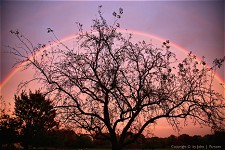
Download Study Card
Podcasts from Hebrew for Christians
10.15.17 (Tishri 25, 5778) Some people learn better by hearing than by visual means, and for that reason I am considering doing a weekly "podcast" that will give general information about our weekly Torah readings (as well as holiday information and Bible discussion). If there is enough interest, I might also develop meditations, inspirational messages, and additional discussions concerning theological and philosophical matters related to our faith. Take a listen to the attached sample broadcast which runs for about 30 minutes. My wife loves this idea since she enjoys listening to messages using her phone. Please let me know if you would find these podcasts helpful. Shavuah tov and shalom chaverim!
Gospel in the Garden...

[ The following is related to our Torah portion for this Shabbat, parashat Bereshit... ]
10.14.17 (Tishri 24, 5778) The very first prophecy of the Torah concerns the promise of the coming "seed of the woman" who would vanquish the serpent (nachash) that had originally tempted and deceived Eve (Gen. 3:15). This prophecy is sometimes called the proto-euangelion ("first gospel"), since it is the starting point of all subsequent prophecy and redemptive history revealed in the Scriptures. Indeed, since the mystery of the Incarnation of the Son of God is foreshadowed here, this prophecy is linked to the original woman, Eve. Just as Eve became a carrier of the corruption of human nature by heeding the voice of the tempter, so she would be the carrier of God Himself for the deliverance of mankind through the advent of the Redeemer. In the tragic aftermath of the transgression of the first man and woman, then, God first announced His unfailing redemptive love for the human race that would culminate in the birth, sacrifice, and resurrection of Yeshua our Savior and Deliverer - "born of a woman, born under the law" (Gal. 4:4).
Our restoration begins with God's love and passion. God's first question to Adam after he broke covenant was: "Where (אַיֶּכָּה) are you?" - the voice of a loving Father in search of his son (Gen. 3:9). Of course God knew exactly how his son was attempting to hide, though He almost acted as if He was unwilling to believe that he would betray his love by disobeying His commandment. Therefore God's poignant question was directed to Adam's heart: "Oh my son, how did you get to this place?" God was giving Adam an opportunity to turn back to Him, to confess the sin, to undergo teshuvah, to become reconciled... This is the necessary prelude to any honest relationship with God.
Recall that the promise of the coming Savior was given within the context of the curse and judgment upon Satan: "I will put enmity between you and the woman, and between your seed and her seed; he shall crush your head, and you shall crush his heel" (Gen. 3:15). That God's promise was first directed to Satan is surely by design, since he "left his first estate" by becoming the "monster in the garden" and was therefore primarily responsible for the transgression of Adam and Eve in the first place (Ezek. 28:13-15,19). The promise delivered to Satan was therefore one of coming retribution and divine judgment: Evil would not have the last word in the matter of mankind, and therefore Satan's schemes would be avenged by God in the fullness of time (Gal. 4:4-5). Notice, however, that Adam and Eve were not yet judged for their sin when the LORD God gave the promise of the coming of the Redeemer. Before a word of judgment was directed toward them, God's love and light was already revealed. Indeed, immediately after their judgment was pronounced, "the LORD God made tunics of skin for Adam and his wife and clothed them" (Gen. 3:21) - a clear picture of being compassionately "robed in righteousness" imparted by an innocent sacrifice. The very first sacrifice recorded in the Torah - performed by God Himself - prefigured the coming redemption by the "seed of the woman" who would die as a substitutionary sacrifice for their sins (this further explains why Eve's son (Abel) offered a blood sacrifice that was accepted by the LORD, whereas Cain's offering the "fruit of the earth" was rejected).
The first prophecy of Torah therefore describes - in the most succinct form - the coming of the Savior and the great conflict of the ages. First, God declares that He would put enmity (אֵיבָה) between Satan and the woman. This enmity, or "hostile hatred," was based on the memory of Eve's misguided trust she evidenced in the garden. When Eve first sympathetically listened to the lies of the nachash (serpent), she immediately began her descent into exile and became a temptress herself. Her first step toward sin was a gullibility or openness that ultimately resulted in a lack of trust of God (which is part of the reason why we must be saved by trusting, as a "like-for-like" reversal of the original sin). At the very dawn of human history, then, we see that "truth" (אֱמֶת) apart from God (א) leads to death (מֵת). Eve was deceived because of Satan, but Adam deliberately chose to disobey God (2 Cor. 11:3; 1 Tim 2:14). In response to her teshuvah (repentance), God blessed Eve before He judged her by imparting to her a God-given hatred for Satan and his lies, as well as the promise that she would take part in the birth of the Savior of mankind. The first promise of the gospel, then, focused on the woman and her role in the coming redemption. Notice that Adam later renamed his wife Eve (i.e., Chavah: חַוָּה, the "mother of life") as an expression of his faith that the promised seed would come through her.
For more see: "The Gospel in the Garden: Further thoughts on Parashat Bereshit."
Creation for the Messiah...
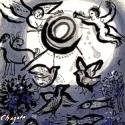
[ The following is related to our Torah portion for this week, parashat Bereshit... ]
10.13.17 (Tishri 23, 5778) The Talmud says "All the world was created for the Messiah" (Sanhedrin 98b). Likewise the New Testament had earlier said: "All things were created by Him (i.e., Yeshua), and for Him" and in Him all things consist (συνεστηκεν, lit. "stick together") (Col. 1:16-17). The first word uttered by God, "Let there be light" (Gen. 1:3), was uttered on behalf of all who would behold His glory, as it is written, "Arise, shine forth, for your light has come" (Isa. 60:1). When Adam first opened his eyes and human consciousness was born, he immediately understood that the LORD created all things, including himself. According to midrash, Adam's first words were, יהוה מֶלֶךְ עוֹלָם וָעֶד / Adonai malakh olam va'ed: "The LORD is King for ever and ever." God then said, "Now the whole world will know that I am King," and He was very pleased. This was the "tov me'od" (טוֹב מְאד) moment of creation, when God saw all that He had made "and found it very good" (Gen. 1:31). Therefore the name for man (i.e., adam: אָדָם) is connected with the word for "very" (i.e., me'od: מְאד): the birthday of humanity is therefore the Coronation Day for the King of the Universe.
The implication that the LORD God is our Creator is enormous and pervades everything else in our lives. God's creative power is witnessed by all conscious life. The Divine Light that was created before the sun and the stars represents God's immanent presence that "lights up" all of creation - including our minds (Gen. 1:3). Since we were created b'tzelem Elohim, "in the image of God," the witness of God's truth is foundational to all of our thinking as well. The revelation (not the invention) of logical first principles is part of God's "signature," if you will, of how the mind is wired to reality. Likewise we have intuitive awareness regarding the existence of moral truth (i.e., the standard of justice and moral law), aesthetic truth (i.e., ideals of beauty, goodness, worth, and love), and metaphysical truth (i.e., cause and effect relationships). "The heavens are recounting the glory of God, and the expanse is proclaiming his handiwork" (Psalm 19:1). God's power and presence can be clearly inferred from the tremendous effect of the universe itself. As Paul stated, "the invisible things of Him (τά ἀόρατα αὐτοῦ) from the creation of the world are clearly seen (καθοράω), so that people are without excuse" (Rom. 1:19-20). It is the fear of the LORD (יִרְאַת יהוה) that is truly the beginning of wisdom and knowledge (Psalm 111:10; Prov. 1:7; 9:10). The Hebrew word for fearing (ירא) and seeing (ראה) share the same root. We cannot truly see reality apart from reverencing God as the Lord and King of Creation.
It was asked for what purpose mankind was created. One said to purify the soul; another said to gain wisdom; another to serve God. Nay, but understand that man was created to elevate the heavens, to celebrate the heart of the Father, and to be needed by heaven's embrace... To focus on ourselves, on our purification, our "religion," misses the greater point that only God's love makes true life possible....
Shabbat shalom and blessings to you, my friend. May this coming year be one of growth and maturity for us all as we press forward to attain the high calling of our Messiah. - John
Spelling out "Bereshit"...

[ The following is related our Torah portion for this week, parashat Bereshit... ]
10.13.17 (Tishri 23, 5778) The 18th century Torah sage Vilna Gaon taught that the Hebrew word "bereshit" (בְּרֵאשִׁית), which is the very first word of the Bible, may be thought of as an acronym for meaningful spiritual life. The first letter, Bet (בּ), stands for bittachon (בִּטָּחוֹן), a word that means complete trust in God's love for your life; the next letter, Resh (ר), stands for ratzon (רָצוֹן), or the desire to live according to God's will; the central letter Aleph (א) stands for ahavah (אַהֲבָה), which is the love for God and for our fellow man (Deut. 6:5; Lev. 19:18); and the letter Shin (שׁ) is for shetikah (שְׁתִיקָה), or "keeping silent," which is the cardinal virtue of godly self-control and wisdom (James 1:26; 3:1-18; Psalm 34:13; Prov. 13:3, etc.). The letter Yod (י) is for yirah (יִרְאָה), or reverence for God's authority and dignity; and finally, the letter Tav (ת) is for Torah (תּוֹרָה), the study of which brings transformation and sanctity to your life (Psalm 19:7; Psalm 119:105; Prov. 6:23; Matt. 5:17-19; 2 Tim. 2:15-16).
The Divine Light...
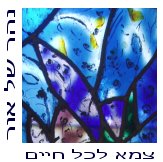
10.13.17 (Tishri 23, 5778) "And God said, "Let there be light," and there was light. And God saw that the light was good. And God separated the light from the darkness" (Gen. 1:3-4). The Divine Light of the first day of creation is not the same as the light of the cosmic spheres. God created the sun, moon, and stars on the fourth day to demonstrate that everything in the universe was created through the light of His Word (Gen. 1:14-19). If the sun had been created before everything else (big bang), it could have been said that the world was without beginning, and the earth produced life through the influences of astronomical bodies. The Torah states that plants were created before the sun and moon to indicate that nothing can exist apart from God's sovereign will. Yehi ... Vayhi ... God called everything into being by the Word of His Power. Therefore we recite the blessing in the Name of the Word of God: Barukh atah Adonai Eloheinu melekh ha'olam shehakol niyah bidvaro: "Blesssed are You, LORD our God, Master of the Universe, who brings forth all things by His Word."
וַיּאמֶר אֱלהִים יְהִי אוֹר וַיְהִי־אוֹר
וַיַּרְא אֱלהִים אֶת־הָאוֹר כִּי־טוֹב
וַיַּבְדֵּל אֱלהִים בֵּין הָאוֹר וּבֵין הַחשֶׁךְ
וַיִּקְרָא אֱלהִים לָאוֹר יוֹם וְלַחשֶׁךְ קָרָא לָיְלָה
וַיְהִי־עֶרֶב וַיְהִי־בקֶר יוֹם אֶחָד
va·yo·mer · E·lo·him · ye·hi · or, · vay·hi · or
va·yar · E·lo·him · et · ha·or · ki · tov
va·yav·del · E·lo·him · ben · ha·or · u·ven · ha·cho·shekh
va·yik·ra · E·lo·him · la·or · yom · ve·la·cho·shekh · ka·ra · lai·lah
vay·hi · e·rev · vay·hi · vo·ker · yom · e·chad

"And God said, "Let there be light," and there was light.
And God saw that the light was good.
And God separated the light from the darkness.
God called the light Day, and the darkness he called Night.
And there was evening and there was morning, the first day."
(Gen. 1:3-5)
The word "light" appears five times in this passage, which prompted the sages to say there are five kinds of light, each corresponding to a book of the Torah. "Let there be light" refers to the Book of Genesis and the Divine Light of Messiah; "and there was light" refers to the Book of Exodus, when during their deliverance from Egypt Israel had redemptive light of Messiah within their homes; "God saw the light" refers to the Book of Leviticus, which deals with the light of Messiah's sacrifice and atonement - the light of teshuvah; "God separated the light from the darkness" refers to the Book of Numbers, when God judges evil by the truth of King Messiah; and finally, "God called the light Day" refers to the Book of Deuteronomy, which enlightens the eyes of those who love the Messiah b'khol levavkha...
Seedbed of Creation...

[ The following is related to our Torah portion for this Shabbat, parashat Bereshit... ]
10.13.17 (Tishri 23, 5778) The Scroll of Genesis (סֵפֶר בְּרֵאשִׁית) is truly the "beginning," the "root," and the "seedbed" of all the subsequent Scriptures - including the message of Yeshua and the revelation of the New Testament. In Genesis we see the creation and ruin of man through sin, but we take hold of the promise of deliverance through the coming Seed of the woman; in the Book of Exodus (שְׁמוֹת) we see God's powerful redemption secured through the blood of the Lamb; in the Book of Leviticus (וַיִּקְרָא) we encounter communion and atonement in the holy sanctuary; in the Book of Numbers (בַּמִדְבַּר) we experience the leading of God through desert places, and in the Book of Deuteronomy (הַדְּבָרִים) we are renewed by God's faithfulness before we take hold of our inheritance. Ultimately, the concluding book of the Bible, the Book of Revelation, serves as a climactic "final chapter" of the story begun in Genesis, where the Tree of Life (עֵץ הַחַיִּים) is restored to the midst of the paradise of God, and the presence of sin and death have been forever eradicated....
Everything begins with the foundational truth that Almighty God is our personal Creator (הַבּוֹרֵא). This is the first principle of all rational thinking: "In the beginning (בְּרֵאשִׁית), God created the heavens and the earth" (Gen. 1:1). Notice that the word "beginning," i.e., bereshit, comes from the word reishit (רֵאשִׁית), meaning first or best (Psalm 111:10), which does not necessarily mean "the beginning" in a temporal sense (הַרִאשׁוֹן), but rather primacy or rulership over all that exists. Indeed, the word includes the root idea of "head" (ראשׁ), which suggests the "head of all things," that is, to the Messiah, the Creative Word of God who is the "head of all beginning and authority" and through Whom and for Whom all things were created (Col. 1:16; 2:10).
For more on this subject, please see: Genesis and the Seedbed of Creation.
The Song of Desire...

[ The following is related to our Torah portion for this week, parashat Bereshit... ]
10.13.17 (Tishri 23, 5778) The midrash says that the word "bereshit" (בְּרֵאשִׁית) can be arranged to spell shir te'ev (שִׁיר תְּאֵב), meaning the "song of desire." This is the holy plea sounded by all of creation to be made whole, healed, and ultimately perfected. As it says in our Scriptures: "For the creation was subjected to futility, not willingly, but because of him who subjected it in hope" (Rom. 8:20). Therefore when we take hold of Yeshua's heart, vision, and mission, we partake in the repair of the world (תיקון עולם) by testifying of God's healing love given in Messiah. We begin and end our journey to life with the "song of desire" on our lips – that is, with our heart awakened to its need for God. As it says: "The LORD is near to all who call on him, to all who call on him in truth. He fulfills the desire of those who fear him; he also hears their cry and saves them" (Psalm 145:18-19).
אֲנִי לְדוֹדִי וְעָלַי תְּשׁוּקָתוֹ
ani · le'do·di · ve·a·lai · te·shu·ka·to

"I am my beloved's, and his desire is upon me."
(Song 7:10)

Olam Malei - An Entire World...

10.13.17 (Tishri 23, 5778) God made you entirely unique, and no one else was created for the special role that you have in the overarching plan of Almighty God... Jewish tradition says that God created Adam alone as "olam malei" (עוֹלָם מָלֵא), "an entire world," to teach that each individual is of great value and significance. "Thus anyone who sustains one individual has sustained the world; and anyone who destroys one individual has destroyed an entire world" (Sanhedrin 37a). In addition, God created man as a solitary creation to remind all people that they descend from a common source: No one has a greater or better lineage or "pedigree" than anyone else. Moreover, each of us is created with a radical sense of "aloneness," a built in "hunger" for relationship and especially for God's presence. Therefore the very first commandment to Adam and Eve comes in the form of a blessing: "And God blessed them and said, פְּרוּ וּרְבו / pru urvu: "be fruitful and multiply" (Gen. 1:28). People were created to be in fellowship with others and with God, and when this is lacking, there is a profound soul hunger and need....
Every Letter of Torah...
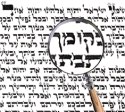
10.12.17 (Tishri 22, 5778) This week's Torah portion (for Simchat Torah) is called Vzot HaBerakhah ("this is the blessing"), which is also the last portion of the entire Torah. After reading this portion, we will "rewind the scroll" back to parashat Bereshit to begin reading the scroll all over again. We do this every year because Talmud Torah - the study of Torah - is a cyclical venture that equips us to better understand the Scriptures - including the New Testament.... In this connection, it is interesting to note that the first letter of the Torah is a Bet (בּ) in the word bereshit (בְּרֵאשִׁית), and the last letter of the Torah is a Lamed (ל) in Israel (יִשְׂרָאֵל). Putting these together, we get the word lev (לֵב), "heart," suggesting that the entire Torah - from the first letter to the last - reveals the heart and love of God for us. Moreover, the first letter of Scripture is a Bet (בּ), as explained above, and the last letter is a Nun (ן) in the word "Amen" (אָמֵן), so the whole Bible - from beginning to end - reveals the Person of God the Son (בֶּן) for us...
The Hebrew exclamation, "Yasher Koach!" (יָשֶׁר כּחַ) means "May your strength be firm," and is often said to congratulate people who have succeeded in their Torah studies. For those of you who have studied Torah over this last Jewish year, let me extend to you a heartfelt "Yashar Koach!" And since we are finishing the entire Torah cycle for this year, it is customary to enjoy a festive party (i.e., a siyyum: סִיּוּם) celebrating the completion of the study of a Jewish text. Studying the Torah is a great joy, chaverim, since it reveals the truth to us and helps us understand the LORD of Glory. As King David said, "You make known to me the path of life (ארַח חַיִּים); in your presence there is fullness of joy (שִׂמְחָה); at your right hand (i.e., with a fire of knowledge (אֵשׁ דָּת) at His right hand) there are pleasures forevermore" (Psalm 16:11).
Mystery and Creation...

10.11.17 (Tishri 21, 5778) Why is there something rather than nothing? Why does anything exist at all? These are basic questions about the meaning of life. Where do we come from? What are we? Where are we going? "God created the universe," you say, yes, but exactly why did He do so? What purpose did he have in mind? In particular, why were you created? What is the purpose of your life? What do you hope to achieve with the limited amount of time you have on this earth? Such questions brood within the soul, even if they are hidden from consciousness by various forms of busyness and distraction. At the outset of serious thinking about anything at all we are confronted with such ultimate questions. What is real? Why are we here? Where are we going? What does God want from us?
"Where am I? Who am I? How did I come to be here? What is this thing called the world? How did I come into the world? Why was I not consulted? And If I am compelled to take part in it, where is the director? I want to see him." - Soren Kierkegaard
The Torah begins: "In the beginning God created..." (Gen. 1:1). No explanation is given, simply the mysterious declaration that God's eternal power is behind the realm of the world of appearances. We only begin to get some idea of God's hidden purposes as he reveals his design in Scripture. There we learn that God chose to create the universe yesh me'ayin, "out of nothing," in order to share his wisdom, glory, and love with other beings He created. "You created all things, and for Thy pleasure they are and were created" (Rev. 4:11). All this was for the sake of the Messiah, who built the world in chesed (חֶסֶד) and who forever reigns as the King of eternal life and love. "For from him and through him and to him are all things" (Rom. 11:36). The purpose of your life is to learn that you are beloved by God, to know and receive the infinite worth you have in his eyes, and to share that love with others. Indeed, you were created to be made part of God's great family, the Kingdom of Love...
For more on this topic see: "Creation and the Kingdom of Love..."
In the Beginning...
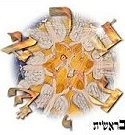
10.11.17 (Tishri 21, 5778) Our Torah for this week (Bereshit) re-opens the Bible with these famous words: "In the beginning, God created the heavens and the earth" (Gen. 1:1). Notice, however, that the Hebrew word translated as "beginning" (i.e., bereshit: בְּרֵאשִׁיתּ) logically does not mean a point in chronological time, since time, regarded as the measurement of motion, is inextricably connected to existence and came into being with creation itself. Time and being are therefore linked. Therefore, it is better to understand bereshit to mean "with wisdom," since the word is based on the root idea of rosh (ראשׁ, "head," or "chief"), which suggests what is most important, i.e., "at the head of (all things)," "bechor," etc.
"In the beginning, God created the heavens and the earth" (Gen. 1:1). Another way to read this statement is to notice the direct object marker (אֵת) of the verb bara (בָּרָא) in the first verse. Read literally, it would say, "With wisdom (or "within his own mind [i.e., rosh: ראשׁ] or counsel") God created all things - Aleph through Tav - namely, the heavens and the earth." Some have said the direct object marker here refers to Yeshua, and while it is indeed true that He is the Aleph and Tav (Rev 1:8), the Direct Object of the Universe -- "the One who is and who was and who is to come, the Almighty" -- in this verse he is Elohim (אֱלהִים), our Creator, which agrees with many other Scriptures such as Col. 1:15-17, Heb. 1:1-3; John 1:1-14; Eph 1:21; Phil. 2:9-11, Rom. 14:11 (with Isa. 45:22-24); Rom. 11:36, etc. Others have said "Aleph-Tav" here refers to the holy alphabet, the power from the Word.
 |
Providential Creation (השגחת השם)
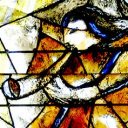
10.11.17 (Tishri 21, 5778) When you feel discouraged or anxious because of difficult times, remember how the LORD God created the world and sustains it for the sake of the revelation of his love for you... You may not understand the present moment, though you can assuredly trust that God's salvation given in the Messiah Yeshua heals you forever and ever. Declare at all times, then: "The world was created for my sake, though I am but dust and ashes." God is faithful, the great Amen of the human heart's cry. Your inner being is redeemed by God for you to experience and know the blessing of eternal life (John 17:3).
בָּרוּךְ אַתָּה יְהוָה אֱלהֵינוּ מֶלֶךְ הָעוֹלם
שֶׁהַכּל נִהְיָה בִּדְּבָּרוֹ
ba·rukh · at·tah · Adonai · E·lo·hey·nu · me·lekh · ha·o·lam
she·ha·kol · ni·he·yah · bi·de·va·ro

"Blessed are you LORD our God, King of the Universe,
who brings about everything by His Word."
Because you are made in the image of God, you are mikdash me'at, a small sanctuary or "temple" for the LORD (Luke 17:20-21; Rom. 14:17; 1 Cor. 6:19).
Seedbed of Creation...

[ The following is related to our Torah portion for this Shabbat, parashat Bereshit... ]
10.11.17 (Tishri 21, 5778) The Scroll of Genesis (סֵפֶר בְּרֵאשִׁית) is truly the "beginning," the "root," and the "seedbed" of all the subsequent Scriptures - including the message of Yeshua and the revelation of the New Testament. In Genesis we see the creation and ruin of man through sin, but we take hold of the promise of deliverance through the coming Seed of the woman; in the Book of Exodus (שְׁמוֹת) we see God's powerful redemption secured through the blood of the Lamb; in the Book of Leviticus (וַיִּקְרָא) we encounter communion and atonement in the holy sanctuary; in the Book of Numbers (בַּמִדְבַּר) we experience the leading of God through desert places, and in the Book of Deuteronomy (הַדְּבָרִים) we are renewed by God's faithfulness before we take hold of our inheritance. Ultimately, the concluding book of the Bible, the Book of Revelation, serves as a climactic "final chapter" of the story begun in Genesis, where the Tree of Life (עֵץ הַחַיִּים) is restored to the midst of the paradise of God, and the presence of sin and death have been forever eradicated....
Everything begins with the foundational truth that Almighty God is our personal Creator (הַבּוֹרֵא). This is the first principle of all rational thinking: "In the beginning (בְּרֵאשִׁית), God created the heavens and the earth" (Gen. 1:1). Notice that the word "beginning," i.e., bereshit, comes from the word reishit (רֵאשִׁית), meaning first or best (Psalm 111:10), which does not necessarily mean "the beginning" in a temporal sense (הַרִאשׁוֹן), but rather primacy or rulership over all that exists. Indeed, the word includes the root idea of "head" (ראשׁ), which suggests the "head of all things," that is, to the Messiah, the Creative Word of God who is the "head of all beginning and authority" and through Whom and for Whom all things were created (Col. 1:16; 2:10).
Many of the traditional sages state that "in the beginning" (בְּרֵאשִׁית) refers to the wisdom of the Torah. Quoting Proverbs 8:22, these sages actually say that God created the world for the sake of Torah, what they call "reshit darko" (רֵאשִׁית דַּרְכּוֹ). In other words, wisdom (i.e., chokhmah: חָכְמָה) is personified as the Torah, the Agency of Power that created the universe. In light of the New Testament, we understand the divine wisdom personified as Yeshua our Messiah - the expression of God's will in creation... the manifestation of the "strong arm" of the LORD and his mighty power that created the enormous complexity of the universe yesh ma'ayin, "out of nothing..." Indeed, Yeshua is the Living Torah (i.e., ha'Torah ha'chayim: התורה החיה) and the the Lamb slain before the foundation of the world - the One revealed before creation as its source and end. As it says in the New Testament: בְּרֵאשִׁית הָיָה הַדָּבָר - "in the beginning was the Word," וֵאלהִים הָיָה הַדָּבָר - and God was the Word... הַכּל נִהְיָה עַל־יָדוֹ - All things were made by Him, and without Him was not anything made that was made (John 1:1,3). Followers of the Messiah Yeshua do not worship a book, though the LORD our God is indeed the faithful Lawgiver, the Source of all truth and therefore he can never contradict the perfections of his own inner nature. Only the LORD God Almighty receives the glory of creation forever and ever (Rev. 4:11).
God freely chose to create the universe in order to share his wisdom, glory, and love with other beings he created... All this was for the sake of the Messiah, who built the world in chesed (חֶסֶד) and who forever reigns as the King of eternal life and love.
יְהוָה קָנָנִי רֵאשִׁית דַּרְכּוֹ קֶדֶם מִפְעָלָיו מֵאָז
Adonai · ka·na·ni · re·shit · dar·ko · ke·dem · mif·a·lav · me·az

"The LORD possessed me at the beginning of his way,
before his works of old" (Prov. 8:22)
The Book of Genesis itself begins by stating that on the "first day" God created the heavens and the earth:
בְּרֵאשִׁית בָּרָא אֱלהִים אֵת הַשָּׁמַיִם וְאֵת הָאָרֶץ
be·re·shit · ba·ra · E·lo·him · et · ha·sha·ma·yim · ve·et · ha·a·retz

"In the beginning God created the heavens and the earth"
(Gen. 1:1)
The term "heavens" here (שָׁמַיִם) refers metaphorically to God's exalted throne that was surrounded by innumerable angels who were present at the time of creation (Job 38:4-7), and the term "earth" (אָרֶץ) refers to a state of watery chaos (from רוּץ, suggesting running water) that was part of the primordial material of creation itself (indeed the word for "heavens," sha- (ש) + mayim (מַיִם), implies a connection with the original waters (mayim) of creation). God then created the divine light and separated it from darkness (Gen. 1:3-5). On the second day, God separated the waters to create the atmosphere (Gen. 1:6-8); on the third day, God separated the earth from the waters and created vegetative life and seeds (Gen. 1:9-13). On the fourth day, the cycle was renewed: God first created the celestial lights (sun, moon, stars) to mark the seasons and time (Gen. 1:14-19). On the fifth day, He brought forth fish from the waters and birds from the atmosphere (Gen. 1:20-23), and on the sixth day, God brought forth living creatures from the earth (Gen. 1:24-25), culminating in the creation of mankind in his image and likeness (Gen. 1:26-31). Of Adam, it was written, "whose father was God" (Luke 3:38), since he bore the divine seed that was to be "planted" and rooted in God's house of creation. The rest of the Bible, in a sense, is the story of the "prodigal son" and how he returns home to his father...
In the account of the creation (בְּרִיאָה) given in Genesis, it is important to understand that the grammar of the text clearly speaks of creation in six literal days... The Hebrew word yom (יוֹם), or "day," always refer to a distinct 24 hour solar day when it is used in reference to evening and morning or when used in reference to a stated number of days. The formula, "it was evening, and it was morning, one day" (וַיְהִי־עֶרֶב וַיְהִי־בקֶר יוֹם אֶחָד), further indicates that day follows night, since light was created (and separated) out of darkness. This explains why we start the Sabbath and festivals at sunset of the night before. The idea of a literal six days of creation is also the foundation for the weekly Sabbath itself: "For in six days the LORD made heaven and earth, the sea, and all that is in them, and rested on the seventh day. Therefore the LORD blessed the Sabbath day and made it holy" (Exod. 20:11).
The idea that "day" refers to an indefinitely long period of geological time is a modern invention based on Enlightenment ideals of science.... Attempting to reconcile so-called evolutionary theory with the account of creation given in the Torah actually undermines the message of the gospel itself, since it puts death, disease, suffering, etc., before the transgression of Adam and Eve. Moreover, it is evident that Yeshua believed in the literal creation of Adam and Eve (Mark 10:6) and therefore he held to a "young earth" theory, just as he believed in a worldwide (not local) flood during the days of Noah (Matt. 24:37-39).
Likewise the so-called "gap theory" (i.e., the idea that there is a "gap" of time between Gen. 1:1 and Gen. 1:2 wherein Satan was judged causing God to re-created the earth) is obviously in error since it disregards the testimony of Yeshua regarding the uniqueness of the creation of Adam and Eve "in the beginning," and it furthermore undermines the radical consequence of their sin. Neither does it adequately explain the mystery of evil (i.e., the presence of the "monster in the garden") nor the exile from the garden because of Adam and Eve's disobedience... It is true that later judgments of God allude to the idea of "tohu va'vohu" (e.g., Isa 34:11; Jer 4:23), but it must be stressed that this usage in the prophets should not be "read into" the description of the earth during creation.... There is no mention of a "gap" theory in the Scriptures, so it is an argument from silence, really, though there is a lot of witchcraft and midrash that talk about Lilith, etc. as Adam's first wife, etc. In the Fourth Commandment it is clearly stated that the heavens, the earth, the seas, and all that is in them were created in literally six days (Exod. 20:11). That God created the universe over a six day period (rather than in a single instant) is of course a mystery, though it is attested quite literally by the the hand of God Himself (Exod. 24:12; 31:18).
Notice finally that the Divine Light (האור האלוהי) of the first day of creation (Gen 1:3) is not the same as the light of the cosmic spheres. God created the sun, moon, and stars on the fourth day to demonstrate that everything in the universe was created through the light of His Word (Gen. 1:14-19). If the sun had been created before everything else (big bang), it could have been said that the world was without beginning, and the earth produced life through the influences of astronomical bodies. The Torah states that plants were created before the sun and moon to indicate that nothing can exist apart from God's sovereign will. Yehi ... Vayhi ... God called everything into being by the Word of His Power (בִּדְבַר גְּבוּרָתוֹ). Therefore we recite the blessing: Barukh atah Adonai Eloheinu melekh ha'olam shehakol niyah bidvaro, translated as: "Blesssed are You, LORD our God, Master of the Universe, who brings forth all things by His Word."
וַיּאמֶר אֱלהִים יְהִי אוֹר וַיְהִי־אוֹר
וַיַּרְא אֱלהִים אֶת־הָאוֹר כִּי־טוֹב
וַיַּבְדֵּל אֱלהִים בֵּין הָאוֹר וּבֵין הַחשֶׁךְ
וַיִּקְרָא אֱלהִים לָאוֹר יוֹם וְלַחשֶׁךְ קָרָא לָיְלָה
וַיְהִי־עֶרֶב וַיְהִי־בקֶר יוֹם אֶחָד
va·yo·mer · E·lo·him · ye·hi · or, · vay·hi · or
va·yar · E·lo·him · et · ha·or · ki · tov
va·yav·del · E·lo·him · ben · ha·or · u·ven · ha·cho·shekh
va·yik·ra · E·lo·him · la·or · yom · ve·la·cho·shekh · ka·ra · lai·lah
vay·hi · e·rev · vay·hi · vo·ker · yom · e·chad

"And God said, "Let there be light," and there was light.
And God saw that the light was good.
And God separated the light from the darkness.
God called the light Day, and the darkness he called Night.
And there was evening and there was morning, the first day."
(Gen. 1:3-5)
Notice that the word "light" appears five times in this passage, which prompted the sages to say there are five kinds of light, each corresponding to a book of the Torah. "Let there be light" (יְהִי אוֹר) refers to the Book of Genesis and the Divine Light of Messiah; "and there was light" (וַיְהִי־אוֹר) refers to the Book of Exodus, when during their deliverance from Egypt Israel had the redemptive light of Messiah within their homes; "God saw the light" (וַיַּרְא אֱלהִים אֶת־הָאוֹר) refers to the Book of Leviticus, which deals with the light of Messiah's sacrifice and atonement - the light of teshuvah; "God separated the light from the darkness" (וַיַּבְדֵּל אֱלהִים בֵּין הָאוֹר וּבֵין הַחשֶׁךְ) refers to the Book of Numbers, when God judges evil by the truth of King Messiah; and finally, "God called the light Day" (וַיִּקְרָא אֱלהִים לָאוֹר יוֹם) refers to the Book of Deuteronomy, which enlightens the eyes of the one who loves the Messiah b'khol levavkha, with all of the heart...
For more on this subject, please see: Genesis and the Seedbed of Creation.
Seeing the Unseen...

10.11.17 (Tishri 21, 5778) The Torah begins with the Hebrew letter Bet (בּ), representing the number two, because God created not one world, but two. There is the realm of this world, called olam ha-zeh (עוֹלָם הַזֶּה), and there is the realm of the world to come, called olam ha-ba (עוֹלָם הַבָּא). The letter Bet therefore represents a two-fold house (בַּיִת) - the "house" of physical creation and the "house" of spiritual reality. The letter itself is formed from three Vavs (ו), which add up to 18, the same value for the word chai (חי), or "alive." We are strangers and sojourners here. Life is this present world is likened to a walking a corridor that leads to the next world. Awaken to your eternal end in the world to come: "Know whence you came and to where you are going and before Whom you are destined to give a final accounting" (Pirkei Avot 3:1). Learn to discern "the invisible things of Him from the creation of the world" (Rom. 1:20). "So do not lose heart. Though our outer self is wasting away, our inner self is being renewed day by day. For this light momentary affliction is preparing for us an eternal weight of glory beyond all comparison, as we look not to the things that are seen but to the things that are unseen. For the things that are seen are transient, but the things that are unseen are eternal" (2 Cor. 4:16-18). Press on toward the goal for the prize of the upward call of God in Yeshua our Messiah (Phil. 3:14).
The Great Hosanna...

[ The following is related to the holiday of Sukkot, the "Feast of Tabernacles." ]
10.10.17 (Tishri 20, 5778) The seventh (and last) day of the festival of Sukkot is called Hoshana Rabba (הוֹשַׁנָא רַבָּא). Hoshana (sometimes transliterated as "Hosanna") comes from the Hebrew phrase hoshia na (הוֹשִׁיעָה נָּא), meaning "save us now," combined with "rabbah," meaning "great," to refer to a great corporate plea for salvation. It was on this climactic day of the festival that the people gathered at the Temple for the water ceremony, waving lulavs and circling the courtyard seven times (hakafot) while chanting "Ana Adonai - Hosiah na" (Psalm 118:25), "save us, we pray O LORD!" The New Testament records that it was also on the last day of Sukkot (i.e., "the great day") - perhaps during the water libation ceremony itself - that Yeshua stood up and cried out, "If anyone thirsts, let him come to me and drink. Whoever believes in me, as the Scripture has said, 'Out of his inmost being will flow rivers of living water'" (John 7:37-38; Isa. 12:3).
אָנָּא יְהוָה הוֹשִׁיעָה נָּא אָנָּא יְהוָה הַצְלִיחָה נָּא
בָּרוּךְ הַבָּא בְּשֵׁם יְהוָה בֵּרַכְנוּכֶם מִבֵּית יְהוָה
an·na Adonai ho·shi·ah na / an·na Adonai hatz·li·chah na
ba·rukh hab·bah be·shem Adonai / be·rakh·nu·khem mi·beit Adonai

"Save us, we pray, O LORD! O LORD, we pray, let us thrive!
Blessed is he who comes in the name of the LORD!
We bless you from the house of the LORD."
(Psalm 118:25-26)

Hebrew Study Card
The early sages had taught "at the feast of Sukkot judgment is made concerning the waters," referring to the rain needed for the forthcoming planting season. The historian Josephus calls the ceremonial drawing of water from the Pool of Siloam "the very sacred close (συμπέρασμα) of the year," since the amount of rainfall over the next few months would directly impact the harvest in the spring. The need for rain over the winter months in Israel was an ongoing need for the welfare of the people...
"With joy shall you draw water out of the wells of salvation" (Isa. 12:3). Yeshua once encountered a woman who had come to draw water from a well and said, "Everyone who drinks of this water will be thirsty again, but whoever drinks of the water that I will give him will never be thirsty again. The water that I will give him will become in him a spring of water welling up to eternal life" (John 4:13-14). Likewise he taught earlier in his ministry, "Blessed are those who hunger and thirst for righteousness, for they shall be satisfied" (Matt. 5:6). Just as the people understood they needed physical rain to sustain their physical lives, so Yeshua pointed to himself as the source of "spiritual rain," or "living water" that would sustain their spiritual lives. The "rain of blessing," then, referred to the refreshing power of the Holy Spirit that would become an inner source of life for those who believe... As Yeshua said, "out of his inmost being will flow rivers of living water," which some have thought refers back to the miraculous waters that were given in the desert: "Each soul will be a rock smitten in the thirsty land, from which crystal rivers of life-giving grace shall flow." Indeed the Hallel that is recited during the festival includes the verse: "He turned the rock into a pool of water, the flint into a fountain of waters" (Psalm 114:8).
Note: Hoshana Rabba begins this evening at sundown...
Philosophy of History...
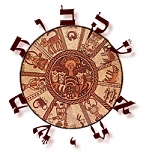
10.10.17 (Tishri 20, 5778) Our actions invariably reveal what we are believing about the nature of reality. We will live what we believe... Put the other way around, what we believe will determine what we do. Nearly all of our conscious intentions are future-directed. We assume that the future will resemble the past, that "the sun will rise again tomorrow," and therefore we make our plans and set our agendas. And yet to what end? What is the purpose of our lives? Where are your actions taking you? Where are you going?
Questions like these concern your personal philosophy of life. Every person makes choices based on their vision and expectation of a future good. Every person therefore lives by a creed that speaks toward the future.... Sadly, many people live for the immediate moments of life: cheap thrills, fast food, and mindless entertainment. "Let's eat and drink, for tomorrow we die" (1 Cor. 15:23). Others may enjoy fine art, reading, and learning - hoping thereby to improve themselves. Most people live in order to love others, friends and family... But apart from God, none of these otherwise good things will ultimately satisfy our hearts. "Disordered love" comes from setting the heart's affections on the transitory, the ephemeral, and the unabiding; but God has set eternity within our hearts (Eccl 3:11). The Lord has "wired" us to experience discontent when our heart's deepest need goes unmet.
On a larger scale, philosophers have asked whether life itself - all of it - has any meaning or purpose. "Why is there something rather than nothing - and for what reason?" Is the universe essentially a random set of events, or is there some overarching purpose and design to everything? Is history linear or cyclical? Does it have a goal or destination, or is this entirely unknowable to us? Are human beings evolving - and if so, to what? Is there a spiritual dimension to reality, or is everything causally determined by matter and motion? Do we have "free will" or are we entirely conditioned to do what we do? Various answers have proposed to deal with these questions over time, including mythological polytheism (e.g., Zoroastrianism, Egyptian/Greek mythology, animism, paganism), cyclical impersonalism (e.g., Hinduism, Jainism, Taoism, reincarnationism, Stoicism), various types of materialism (e.g., scientific naturalism, pragmatism, evolutionism, nihilism), humanism (Buddhism, secular humanism, atheistic existentialism), romantic idealism (Marxism, Hegelianism), mysticism (theosophy, new age thinking, popular Kabbalah), and so on.
The traditional Jewish view of history may be called (for lack of a better term) "monotheistic personalism." There is one Supreme God who is the personal Creator and Ruler of all that exists. God is both immanent (sustaining creation) and transcendent (above creation). This God has a Name (YHVH), a mind, and a moral, purposive will that imbues all of creation. God is LORD over all time and space, the King of Glory, who is Master of all possible worlds. Since God knows and providentially controls everything, human history is a controlled process that leads to a destination. History is therefore "teleological" (progressive) and eschatological - leading to a future goal and endpoint...
But where is everything "going?" In particular, what is the destiny of the human race? If there is a characteristically "Jewish philosophy of history," it decidedly centers on the vision of Zion as the restoration and fulfillment of the lost paradise of Eden. The relationship between Adam and God will be fully restored in the coming theocratic utopia called "heavenly Jerusalem." This is heaven, the place of our deepest longing:
בִּלַּע הַמָּוֶת לָנֶצַח
וּמָחָה אֲדנָי יהוה דִּמְעָה מֵעַל כָּל־פָּנִים
bil·la ha·ma·vet la·ne·tzach,
u'ma·chah Adonai Elohim dim·ah mei·al kol pa·nim

"He will destroy death forever.
The Lord GOD will wipe the tears away from all faces" (Isa. 25:8)
Download Reading Card
It is worth noting that the classical sages divide human history into three epochs of 2,000 years each. The period of "tohu" occurred from the time of the fall of Adam until the call of Abraham; the period of "Torah" occurred from Abraham until the time of the destruction of the Second Temple, and the period of the "Messiah" refers to the time when the Messiah could appear before the Kingdom is established in Zion. The time immediately preceding the appearance of the Messiah will be a time of testing in which the world will undergo various forms of tribulation, called chevlei Mashiach (חֶבְלֵי הַמָּשִׁיחַ) - the "birth pangs of the Messiah" (Sanhedrin 98a; Ketubot, Bereshit Rabbah 42:4, Matt. 24:8). Some say the birth pangs are to last for 70 years, with the last 7 years being the most intense period of tribulation -- called the "Time of Jacob's Trouble" / עֵת־צָרָה הִיא לְיַעֲקב (Jer. 30:7). The climax of the "Great Tribulation" (צָרָה גְדוֹלָה) is called the great "Day of the LORD" (יוֹם־יהוה הַגָּדוֹל) which represents God's wrath poured out upon a rebellious world system. On this fateful day, the LORD will terribly shake the entire earth (Isa. 2:19) and worldwide catastrophes will occur. "For the great day of their wrath has come, and who can stand?" (Rev. 6:17). The prophet Malachi likewise says: "'Surely the day is coming; it will burn like a furnace. All the arrogant and every evildoer will be stubble, and that day that is coming will set them on fire,' says the LORD Almighty. 'Not a root or a branch will be left to them'" (Mal. 4:1). Only after the nations of the world have been judged will the Messianic kingdom (מַלְכוּת הָאֱלהִים) be established upon the earth. The remnant of Israel (she'arit Yisrael) will be saved and the 1000 year reign of King Messiah will then commence (Rev. 20:4).
Note: Hurricanes, earthquakes, famines, plagues, the imminent threat of wars, the rise of militant ideologies that use violence and that are devoid of compassion and truth, the overall heartlessness and harrowing darkness of our time -- all signs we are living in the End of the Age, and we are experiencing the birth pangs of the Messiah's return. May we all turn to the LORD God of Israel while there is still the opportunity, friends! For more on this topic, see "As the Day Draws Near: Jewish Philosophy of History."
Torah as our Heritage...
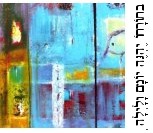
10.09.17 (Tishri 19, 5778) From our Torah reading for this holiday season (i.e., Zot Ha'berakhah: "this is the blessing") we read the following: "Moses charged us (צִוָּה־לָנוּ) with the Torah as the heritage (מוֹרָשָׁה) of the congregation of Jacob" (Deut. 33:4). Note, however, that for the Torah to become part of our heritage as the people of God, it must be seriously studied, wrestled over, and earnestly engaged... This is a happy task we are given, as it is written: "the righteous one delights in the Torah of the LORD (בְּתוֹרַת יְהוָה) and in his Torah he meditates (יֶהְגֶּה) day and night" (Psalm 1:2). Commenting on this verse Rashi noted that God's Torah rightly belongs to the one who labors in it and groans (הָגָה) over its meaning, for only then may it be meaningfully said to be "his Torah" (תּוֹרָתוֹ). However the converse is also true: the one makes no effort to study Torah will soon be without godly direction. We are admonished to be "doers of the word, and not hearers only," since merely assenting to truth without practicing it leads to self-deception (James 1:22). As the Messiah said, "If you know these things, happy are you if you do them" (John 13:17).
Heavenly Repercussions...

10.09.17 (Tishri 19, 5778) "Great is our Lord, and abundant in power; his understanding is infinite" (Psalm 147:5). All things work according to God's sovereign purposes, from beginning to end, so that what might seem to be trivial or insignificant at the time brings in its train other events, and these events cause yet further events, and so on and on. So it is with faith: a small beginning, a quiet prayer groaned within the depths of the heart, can move the hand of God and change the world.
בָּרוּךְ אַתָּה יְהוָה אֱלהֵינוּ מֶלֶךְ הָעוֹלָם
שֶׁהַכּל בָּרָא לִכְבוֹדוֹ
ba·rukh · at·tah · Adonai · E·lo·hey·nu · me·lekh · ha·o·lam
she·ko·cho · u'ge·vu·ra·to · ma·lei · o·lam

"Blessed are you LORD our God, King of the Universe,
whose strength and power fills the world."
Just as you are...

10.09.17 (Tishri 19, 5778) Since God knows the number of hairs on our heads, he also knows those character defects that we do not see in ourselves... Nevertheless we must come to God "just as we are," since what we are is ultimately unknowable by us. This implies that we can't wait to turn to God until we have already confessed our sins, since we often do not know what they are. "Those who are well have no need of a physician, but those who are sick" (Mark 2:17), which means that we come in a state of unknowing blindness to find healing. We don't see so we can turn; we turn so we can see. Confession turns to see God's remedy for our sin, and true teshuvah must begin with hope, with the vision that the LORD is our Helper and the Healer of our souls.
אֶשָּׂא עֵינַי אֶל־הֶהָרִים מֵאַיִן יָבא עֶזְרִי
עֶזְרִי מֵעִם יְהוָה עשֵׂה שָׁמַיִם וָאָרֶץ
es·sa · ei·nai · el · he·ha·rim · me·a·yin · ya·vo · ez·ri
e·zri · me·im · Adonai · o·seh · sha·ma·yim · va·a·retz

"I lift up my eyes to the hills. From where does my help come?
My help comes from the LORD, the Maker of heaven and earth."
(Psalm 121:1-2)

Download Study Card
Just as King David prayed, שְׁגִיאוֹת מִי־יָבִין מִנִּסְתָּרוֹת נַקֵּנִי, "who can understand his errors; cleanse me from nistarot chata'ot, secret sins" (Psalm 19:12), so we likewise trust that God's remedy for our sin will heal even that which is hidden from our own awareness...
The Delight of Torah...

10.08.17 (Tishri 18, 5778) God is not the "author of confusion," and that means that rational intelligibility is foundational to divine revelation. "The Torah was written in the language of men," which is to say, it expresses ideas people can understand. The Scriptures declare: "Blessed is the man who ... delights in the Torah of the LORD (בְּתוֹרַת יְהוָה); all that he does shall prosper" (Psalm 1:1-3). And while it is true that we are no longer 'under' the terms of the covenant given at Sinai (Rom. 3:23), we still delight 'in' the Torah and meditate on its precepts day and night (Psalm 1:2; 19:8; 119:15, 47, 97; Neh. 8:12, etc.). After all, Torah "written upon the heart" is a mark of the New Covenant believer (Jer. 31:31-33). As it is written in Proverbs: "If you seek it [i.e., the wisdom revealed in the Torah] like silver and search for it as for hidden treasures, then you will understand the fear of the LORD and find the knowledge of God" (Prov. 2:4-5). If worldly men seek money and riches for life in this world, should we be less earnest in our pursuit of true and eternal riches?
Furthermore, where it is written, "all Scripture is breathed out by God (θεόπνευστος) and is profitable for teaching, for reproof, for correction, and for training in righteousness, that the man of God may be complete, equipped for every good work" (2 Tim 3:16-17), it is evident that the Scriptures referred to here are the Jewish Scriptures (i.e., the Torah, the Prophets, and the Writings), since they are the foundation, the context, and the overarching matrix for the later New Covenant revelation... These were the Scriptures Yeshua used to contextualize and explain his ministry to his followers: "And beginning with Moses and all the Prophets, he interpreted to them in all the Scriptures the things concerning himself" (Luke 24:27; John 1:45). In other words, the Torah has both a logical, a linguistic, and a theological priority regarding our understanding of the New Testament Scriptures, and the failure to read in context invariably leads to faulty interpretations and doctrinal errors of various kinds. "To the Jew first, and [then] to the Greek" (Rom. 1:16) is a principle not only of how the gospel message would transcend ethnic Israel to be offered to all the nations, but also about how we should approach the practice of Biblical interpretation.... This much is axiomatic: God "breathed out" (θεόπνευστος) his revelation in order, and the message itself must be understood in light of that order (John 4:22).
Since Yeshua the Messiah is Torah Ha'Emet - the True Torah - we should likewise celebrate the "Joy of Torah" (Simchat Torah) in our lives. He is the Living Torah, the Living Word, written upon our hearts so that we can truly dance and embrace the Truth given from God. Indeed, Yeshua did not come to destroy the Torah but rather to fulfill it in our lives (Matt. 5:17-20).
Personal Note: Please remember me (i.e., John) in your prayers, friends... The High Holiday Season is always very busy for me, and this year has been especially so. I am also dealing with some health issues that are debilitating and serious. I appreciate you all and thank God for the opportunity to serve you here. Shalom and happy holidays in Yeshua our Lord!
The Circle of Torah...

10.08.17 (Tishri 18, 5778) Each week in synagogues across the world a portion from the Torah (called a parashah) is studied, discussed, and chanted. Jewish tradition has divided the Torah into 54 of these portions - roughly one for each week of the year - so that in the course of a year the entire Torah has been recited during services. The final reading of this cycle occurs on the holiday of Simchat Torah ("Joy of the Torah"), which immediately follows the holiday week of Sukkot. On Simchat Torah, we celebrate both the completion of the year's Torah Reading cycle as well as the start of a brand new cycle. Each Jewish year, then, we "rewind" the scroll and begin again. The sages have wisely said that you cannot compare studying Torah for the 49th time to studying it for the 50th time....
Our spiritual inheritance is bound up with the Torah: it is part of our story, our history, our heritage (Gal. 3:7; Rom. 4:16; Luke 24:27). The stories of Torah serve as parables and allegories that inform the deeper meaning of the ministry of Messiah: "Now these things happened to them as an example, but they were written down for our instruction, on whom the end of the ages has come (1 Cor. 10:11). "For whatever was written in former days was written for our instruction, that through endurance and through the encouragement of the Scriptures we might have hope" (Rom.15:4). "All Scripture is inspired by God..." which refers first of all to the Torah, the Writings, and the Prophets which attest to the Messiah (2 Tim. 3:16-17). You are therefore no longer a stranger or outsider to the heritage of the LORD but a partaker of the covenantal blessings (Eph. 2:12,19). Disciples of Yeshua are called talmidim (תַּלְמִידִים) -- a word that comes from lamad (לָמַד) meaning "to learn." Among other things, then, following the Messiah means becoming a student of the Scriptures He loved and fulfilled (Matt. 5:17-18; Luke 24:44-45). Only after learning from Yeshua as your Teacher will you be equipped to "go to all the nations and teach" others (Matt. 28:19).
We read V'zot HaBerakhah ("this is the blessing") at the end of Simchat Torah, which is the final portion of the entire Torah itself... After reading this portion, we "rewind the scroll" back to the beginning to begin reading parashat Bereshit. We do this every year because Talmud Torah - the study of Torah - is an ongoing venture in the life of a Jew. In this connection, it is interesting to note that the very first letter of the Torah is the Bet (בּ) in the word bereshit (בְּרֵאשִׁית), and the very last letter of the Torah is the Lamed (ל) in the word Israel (יִשְׂרָאֵל). Putting these letters together we get the word lev (לֵב), "heart," suggesting that the entire Torah - from the first letter to the last - reveals the heart and love of God for us... Moreover, the first letter of Scripture is a Bet (בּ), as explained above, and the last letter is a Nun (ן) in the word "Amen" (אָמֵן), so the whole Bible - from beginning to end - reveals the Person of God the Son (בֶּן) for us...
Since we are about to begin the Torah again for a new year, it is worthwhile to remind ourselves about how the Torah itself begins... In this connection we note that it speaks from an omniscient, "third person" perspective. When we read, "In the beginning, God (אֱלהִים) created the heavens and the earth," we must ask who exactly is speaking? Who is the narrator of the Torah? The very next verse states that the Spirit of God (רוּחַ אֱלהִים) was hovering over the face of the waters (Gen. 1:2), followed by the first "direct quote" of God Himself: i.e., "Let there be light" (Gen. 1:3). The creative activity of Elohim (God) and the presence of Ruach Elohim (the Spirit of God) are therefore narrated by an omniscient Voice or "Word of God." Obviously the Spirit of God is God Himself (who else?), just as the Word of God is likewise God Himself, and therefore the first verses of the Torah reveal the nature of the Godhead. God is One in the sense of echdut, "unity," "oneness," and and so on, though not "one" in the monistic sense of a solipsistic mind (νοῦς). God is beyond all theological predications: there can be no sense of "person" apart from relationship, and therefore God's Personhood entirely transcends all our finite conceptions - and yet God forever is One....
Note: For more on this subject, see "Every Letter of Torah."
A Prophetic Rejoicing...
 |
10.08.17 (Tishri 18, 5778) Regarding the holiday of Sukkot ("Tabernacles") the Torah states, ve'samchta be'chagekha - "you shall rejoice in your holiday" and ve'hayita akh same'ach - "you shall have nothing but joy" (Deut. 16:14-15). But how can Torah command us to rejoice? Can we be forced to dance, sing, and make merry? Holocaust survivor Elie Wiesel wrote, "Ve'samchta be'chagekha (וְשָׂמַחְתָּ בְּחַגֶּךָ) is said to be the most difficult commandment of Torah, but I could never understand why. Only during the war did I understand. Those Jews who, in the course their journey to the end of hope, managed to dance on Simchat Torah... taught us how Jews should behave in the face of adversity. For them, ve'samchta be'chagekha was one commandment impossible to observe -- yet they observed it."
In this connection, let me add that these words are ultimately prophetic: "you shall rejoice; you shall have nothing but joy...." That day is coming, when our tears are wiped away and our wounds are forever healed. Amen. Chag Sukkot Sameach, friends..
Surrounded by His Sukkah...

[ The following is related to the holiday of Sukkot, or the Feast of Tabernacles... ]
10.06.17 (Tishri 16, 5778) The root idea of the word "sukkah" means to cover or surround, as in hedge of protection. The Hebrew root is used when Moses asked to behold God's glory and the meaning of the name YHVH (יהוה), and God said, "Behold there is a place by me where you shall stand on the rock, and while my glory overtakes you I will cover you with my hand (וְשַׂכּתִי כַפִּי עָלֶיךָ) until I have passed by (Exod. 33:21-21). The hand of God (יַד־יְהוָה) is our sukkah, and indeed the LORD writes our names upon his palms and sets us as a seal upon his heart (Isa. 49:16; Sol. 8:6). Likewise David affirmed that God would treasure you within his sukkah and elevate you upon the Rock that is Messiah:
כִּי יִצְפְּנֵנִי בְּסֻכּה
בְּיוֹם רָעָה יַסְתִּרֵנִי בְּסֵתֶר אָהֳלוֹ
בְּצוּר יְרוֹמְמֵנִי
ki · yitz·pe·nei·ni · be·suk·koh
be·yom · ra·ah · yas·ti·rei·ni · be·se·ter · a·ho·lo
be·tzur · ye·ro·me·mei·ni

"For he will hide me in his sukkah
in the day of trouble he will conceal me in the secret place of his tent;
on the Rock he will raise me up"
(Psalm 27:5)
The LORD will "treasure you" (the word tzafan [צָפַן] often is translated as "to hide") in his sukkah, a symbol of his protection of your soul... in the day of trouble he will conceal you in his tent, that is, within his dwelling place, under the shadow of his wings he makes you refuge; he will elevate you upon the Rock which is Messiah (1 Cor. 10:4).
Since God's Name (יהוה) means "Presence," "Breath," "Compassion," "Love," "Healing," and so on, we are surrounded by his Sukkah at all times... In other words, you don't have to be in a physical sukkah to be in His sukkah! May God open our eyes to see his glory!
Sukkot Sameach be'Yeshua (סוכות שמחה בישוע) - Happy Sukkot in Yeshua!
Happy Sukkot Friends!

10.05.17 (Tishri 15, 5778) During the holiday of Sukkot we construct a sukkah, a "booth" or temporary structure, that we will "live in" for the holiday week. Among other things, living in a sukkah is meant to recall God's surrounding love and care for us as we make our journey through the desert of this world on our way to Zion... It is an attempt to make visible the invisible, to catch a glimpse of God's abiding glory. On a spiritual level, however, the essence of Sukkot is "dwelling" or "abiding" in the Divine Presence. And though the LORD is forever enthroned in heaven as our Creator, our King, and our loving Deliverer, and though indeed the heavens shout out his praise and the whole earth is filled with His glory (Isa. 6:3), nevertheless we must make a dwelling within our hearts. In great humility the LORD stands at the door and knocks (Rev. 3:20). "Where does God dwell," it is asked, "but where He is given a place, a sanctuary, a throne within the heart."
 |
Left-to-right (top): 1. Assembling the sukkah; 2. Lulav bouquet; 3. wooden etrog case;
4. table decorations; 5. ornaments to hang from the roof (schach)
(bottom): 1. Emanuel David 21 months old; 2. Josiah with flag; 3. Judah helps hang lights;
4) sukkah decorations; 5) the lights are tested before we decorate
Left-to-right (top): 1. wall hanging art; 2. sukkah decorations; 3. sukkot poster;
4. festive garland of etrogim; 5. lulav blessings
(bottom): 1. brukhim haba'im (welcome!); 2. Judah age 8; 3. yom tov challah cover;
4) erev Sukkot in the sukkah; 5) getting "tuned up" for the holiday
Left-to-right (top): 1. Olga lights yom tov candles; 2. Judah waves lulav; 3. John and Olga with kids;
4. Peer, Yasha, and Josiah; 5. an outside view of the sukkah at night
(bottom): 1. Ushpiz Mike waves lulav; 2. family picture; 3. Yasha waves lulav;
4) Irina waves lulav; 5) a view of the sukka during daylight hours
 |
There are two great questions God always is asking us. The first is "who do you say that I am?" and the second is "will you make a place for me?" Being in a love relationship with God is the goal of life, the "end of the law," and the reason we were created. But we cannot love God apart from understanding his passion for us. The LORD is the "Jealous God," a Consuming Fire, the One who desires all of our heart on the altar (Luke 9:23). Therefore the very first commandment is simply אָנכִי יְהוָה אֱלהֶיךָ, "I AM the LORD your God" (Exod. 20:2), because without "making a place" God's love within your heart, nothing else will follow.
Note: To see larger pictures of our Sukkot celebrations, click here.
Wholeness and Faith..
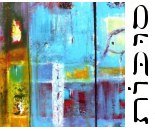
10.04.17 (Tishri 14, 5778) Though Sukkot is called the "Season of Our Joy" (i.e., Z'man Simchateinu) the somber Book of Ecclesiastes (קהֶלֶת) is always recited on the Sabbath of the festival. "Vanity of vanities, says Kohelet, vanity of vanities! All is vanity" (Eccl. 1:2). We read this book to remind us that lasting meaning and purpose is not found in life lived "under the sun" but rather in knowing and serving God. Indeed the Book concludes, "Let us hear the conclusion of the whole matter: Fear God and keep his commandments: for this is the whole [duty of] man" (Eccl. 12:13), though note that the Hebrew text actually reads, ki zeh kol-ha'adam (כִּי־זֶה כָּל־הָאָדָם), "for this is the whole man," which suggests that those who revere the LORD our God and obey His Word are made "whole," that is, healed of their ambivalence and inner vanity...
סוֹף דָּבָר הַכּל נִשְׁמָע אֶת־הָאֱלהִים יְרָא
וְאֶת־מִצְוֹתָיו שְׁמוֹר כִּי־זֶה כָּל־הָאָדָם
sof · da·var · ha·kol · nish·ma · et · ha-E·lo·him · yir·a
ve·et · mitz·vo·tav · she·mor · ki · zeh · kol · ha·a·dam

"Let us hear the conclusion of the whole matter: Fear God
and keep his commandments: for this is the whole man."
(Eccl. 12:13)

Download Study Card
"The grass withers, the flower fades, but the word of our God will stand forever" (Isa. 40:8). Note the great contrast between olam ha-zeh and olam haba – between this present world and the heavenly realm.... Unlike the grass of the field that dries up or flowers that soon fade, the word of God stands forever. And despite the frailty of man and the inevitability of physical death, God's truth endures, which is a foundation upon which we can rest.
But how are the metaphors that man is "like dried up grass" or a "withered flower" intended to comfort us? Do they not, on the contrary, lead us to regard our lives as vain and perhaps meaningless? Yes indeed. Our lives are empty and vain apart from God and His truth. If we find ourselves wincing over such images, it is perhaps time to reexamine the state of our faith: To the extent that we regard this world as our "home" we will find the transience of life to be tragic... For those who are seeking a heavenly habitation, the "City of God" and the fulfillment of the promise of Zion, the fleeting nature of this evil world is ultimately a form of consolation...
Note: For more on this subject, see "Sukkot and Vanity" and "Everlasting Consolation."
Choosing to Believe...
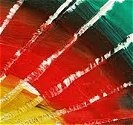
[ The holiday of Sukkot ("Tabernacles") begins Wednesday, Oct. 4th at sundown this year... ]
10.03.17 (Tishri 13, 5778) The Torah describes Sukkot ("Tabernacles") as a holiday of joy and gladness: "You are to rejoice in your festival.... for seven days you shall keep the festival... so that you will be altogether joyful" (Deut. 16:14-15). Nevertheless we may wonder how we can celebrate in a world filled with suffering, death, and misery? Since God commands us to be joyful, however, we must therefore understand joy to be something more than temporal elation or fleeting pleasure, but rather as the result of the decision to believe in healing and life despite the appearances of this realm. "The world to come, the perfect world, we at least believe in; but this material world, this one here and now, how can anyone believe in it? The only thing to do is to run to the refuge of God" (Nachman). The joy of Sukkot, then, is the joy of hope, the conviction that "all shall be well, and all manner of thing shall be well." Darkness will be overcome by the light; evil will become undone; all that is untrue shall be made true; and every tear shall be wiped away... The sukkah symbolizes the "Clouds of Glory" that surround our way in the desert – the "Divine Presence" beheld in faith. We find joy as we choose to believe in the deeper reality of God's sheltering love...
Changed by Love...

10.03.17 (Tishri 13, 5778) How do we change? How are we made new? Is it through self-effort? making resolutions? changing our diet or wardrobe? going into counselling? joining a "religion"? Or do we change by the miracle of God's compassionate intervention in our lives? When Yeshua invites us to turn and come to Him, he wants us to awaken to something so valuable that we would be willing to give up everything in the world to take hold of it (Matt. 13:45-46). True spiritual transformation is not just about leaving your sin behind you (as good as that is), but is rather about discovering the glory of true and infinite life. It's about being the beloved. May the Lord help us see...
God's love sees the hidden beauty, worth, and value of your life. "Again, the kingdom of heaven is like a merchant in search of fine pearls, who, on finding one pearl of great value, went and sold all that he had and bought it" (Matt. 13:45-46). You may be tempted to identify with the merchant and regard this parable as a challenge to give up everything to obtain the surpassing worth of the kingdom of heaven, but another way to understand it is to see God as the Merchant, the central character of the story.... Instead of you paying the great price for the pearl, turn the story around: God pays the price - and you are regarded as His choice pearl! You are a treasured possession, the "apple of God's eye..."
That's the message of gospel, after all. The cross of Yeshua is the end of "self improvement" projects, and that includes the "end of the law" as the means of attempting to find our acceptance before God (Rom. 10:4). We come to know God's love and acceptance "apart from the law," that is, despite our repeated failures, pain, and loss of the false self. We are truly changed as we disclose more and more of what we really are to God, that is, when we come "out of the shadows" to be made visible and healed before His glorious Presence. Then we discover the "lightness" of being united to the risen Messiah and the "law of the Spirit of life in Yeshua (תּוֹרַת רוּחַ הַחַיִּים בְּיֵשׁוּעַ). May God work within us all such a miracle!
Torah First and Last...

[ We read the last -- and first -- portion of Torah during the season of Sukkot.... ]
10.03.17 (Tishri 13, 5778) Our Torah reading for this week is a bit complicated. In addition to the passages we read for the holiday of Sukkot, we will also read the Book of Ecclesiastes (i.e., Kohelet) for the Sabbath of Sukkot. We will also read both the last portion of the Torah (i.e., V'zot HaBerakhah: Deut. 33:1-34:12) as well as the first chapter of the Torah (i.e., Gen. 1:1-2:3) for the holiday of "Simchat Torah" (which immediately follows Sukkot). Finally, on the Sabbath that follows the celebration of Simchat Torah, we will read the entire portion of Bereshit (i.e., Gen. 1:1-6:8). The upshot is that during this season of the year we will read the end of the Torah scroll and then "rewind" it to the beginning...
Every year we read the Torah from beginning to end... We do this every year because Talmud Torah - the study of Torah - is an ongoing venture in the life of a Jew. In this connection, it is interesting to note that the very first letter of the Torah is the Bet (בּ) in the word bereshit (בְּרֵאשִׁית), and the very last letter of the Torah is the Lamed (ל) in the word Israel (יִשְׂרָאֵל). Putting these letters together we get the word lev (לֵב), "heart," (note the similarity to the English word "love") suggesting that the entire Torah - from the first letter to the last - reveals the heart and love of God for us... Moreover, the first letter of Scripture is a Bet (בּ), as explained above, and the last letter is a Nun (ן) in the word "Amen" (אָמֵן), so the whole Bible - from beginning to end - reveals the Person of God the Son (בֶּן) for us...
Note: For more on this subject, see "Every Letter of Torah."
The Holiday of Sukkot (Tabernacles)
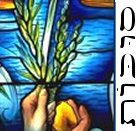
[ The week-long holiday of Sukkot begins Wednesday, Oct. 4th at sundown this year... ]
10.02.17 (Tishri 12, 5778) On the Torah's calendar, there is a quick transition from the somber time of the Jewish High Holidays (Rosh Hashanah through Yom Kippur) to the week-long festival of Sukkot (called "Tabernacles" in the Christian tradition). If the High Holidays focus on the LORD as our Creator, our Judge, and the One who atones for our sins, then Sukkot is the time when we joyously celebrate all that He has done for us. Prophetically understood, the seven days of Sukkot picture olam haba, the world to come, and the Millennial Kingdom reign of Mashiach ben David. If Yeshua was born during Sukkot (i.e., conceived during Chanukah, the festival of lights), then another meaning of the "word became flesh and 'tabernacled with us" (John 1:14) extends to the coming kingdom age, when He will again "sukkah" with his people during the time of his reign from Zion.
Since it represents the time of ingathering of the harvest, Sukkot prophetically prefigures the joyous redemption and gathering of the Jewish people during the days of the Messiah's reign on earth (Isa. 27:12-13; Jer. 23:7-8). Indeed all of the nations that survived the Great Tribulation will come together to worship the LORD in Jerusalem during the Feast of Sukkot (Zech. 14:16-17). The holiday season therefore provides a vision of the coming Kingdom of God upon the earth, when the Word will again "tabernacle with us."
 |
This year Sukkot begins just after sundown on Wednesday, Oct. 4th (i.e., Tishri 15 on the Jewish calendar). The festival is celebrated for seven days (i.e., from Tishri 15-21) during which we "dwell" in a sukkah -- a hut of temporary construction, with a roof covering (schach) of raw vegetable matter (i.e., branches, bamboo, etc.). The sukkah represents our dependence upon God's shelter for our protection and divine providence. We eat our meals in the sukkah and recite a special blessing (leshev Ba-Sukkah) at this time.
The Lulav Bouquet...
In addition to the Sukkah, the most prominent symbol of Sukkot is the Arba'at Ha-minim (אַרְבַּעַת הַמִּינִים) - "the Four Species," or four kinds of plants explicitly mentioned in the Torah regarding the festival of Sukkot: "On the first day you shall take: 1) the product of goodly trees (etrog), 2) branches of palm trees (lulav), 3) boughs of leafy trees (hadas), and 4) willows of the brook (aravot), and you shall rejoice before the LORD your God for seven days" (Lev. 23:40). We wave the "four species" (held together as a bouquet with the etrog) and recite a blessing (netilat lulav) to ask God for a fruitful and blessed year.
 |
Sukkot marks the conclusion of the Jewish Fall Holidays and is the last of the three Shelosh Regalim (שלוש רגלים, i.e., the three annual pilgrimage festivals: Pesach (Passover), Shavuot (Pentecost), and Sukkot (Tabernacles) (Deut. 16:16). It can be argued that Sukkot is the climax of all the festivals in Scripture: Everything leads to it as a culmination in God's prophetic plan. It is interesting to compare the use of words relating to simchah [joy] in the description of these three festivals. Regarding Pesach, the word simchah does not appear at all (Deut. 17:1-8); regarding Shavuot, it appears only once (Deut. 17:11); but, regarding Sukkot, simchah appears several times. For instance:
You shall keep the Feast of Sukkot seven days, when you have gathered in the produce... You shall rejoice in your feast (וְשָׂמַחְתָּ בְּחַגֶּךָ אַתָּה)... because the LORD your God will bless you in all your produce and in all the work of your hands, so that you will be altogether joyful. (Deut. 16:13-15)
Sukkot is called "z'man simchateinu," the "season of our joy." Indeed, in ancient Israel, the joy of Sukkot was so renowed that it came to be called simply "the Feast" (1 Kings 12:32). Sukkot was a time when sacrifices were offered for the healing of the nations (Num. 29:12-40), and it was also a time when (on Sabbatical years) the Torah would be read publicly to all the people (Deut. 31:10-13).
From a spiritual perspective, Sukkot corresponds to the joy of knowing your sins were forgiven (during Yom Kippur) and also recalls God's miraculous provision and care after the deliverance from bondage in Egypt (Lev. 23:43). Prophetically, Sukkot anticipates the coming kingdom of the Messiah Yeshua wherein all the nations shall come up to Jerusalem to worship the LORD during the festival (see Zech. 14:16). Today Sukkot is a time to remember God's Sheltering Presence and Provision for us for the start of the New Year.
Note: The weekly Torah readings are suspended for the week of Sukkot, though we will finish reading the Torah (and begin reading it anew) on the holiday of Simchat Torah, immediately following the holiday. For more information about Sukkot, including how you may observe it as a follower of Yeshua, see the Sukkot pages and their links.
Enshrining the Name...

10.01.17 (Tishri 11, 5778) According to Rashi, Moses gathered the people to assemble the Tabernacle the day following Yom Kippur, that is, the day after he came down from the mountain upon learning the meaning of the name YHVH (Exod. 34:6-7; 35:1-35). For this reason it is traditional to begin building your sukkah on the day following Yom Kippur, recalling the revelation of the covenant of God's mercy: "The LORD is my strength and my song, and he has become my salvation (my Yeshua); this is my God and I will enshrine Him."
עָזִּי וְזִמְרָת יָהּ וַיְהִי־לִי לִישׁוּעָה
זֶה אֵלִי וְאַנְוֵהוּ אֱלהֵי אָבִי וַאֲרמְמֶנְהוּ
o·zi · ve·zim·rat · Yah · vai·hi · li · li·shu·ah
zeh · E·li · ve·an·ve·hu · E·lo·hei · a·vi · va·a·ro·me·men·hu

"The LORD is my strength and my song, and he has become my salvation;
this is my God and I will enshrine Him, God my Father, and I will exalt Him"
(Exod. 15:2)

A midrash dating from the 2nd century BC says that we are to be joyful during Sukkot because it was at this time that Isaac was born: "And we returned in the seventh month, and found Sarah with child before us, and we blessed him, and we announced to him all the things which had been decreed concerning him (Jubilees 16:16). Moved by gratitude to God, Abraham established a festival of joy to celebrate the birth of his long-awaited son by decorating booths (sukkot) and thanking HaShem for the miracle of his heir. "And Abraham took branches of palm trees, and the fruit of goodly trees, and every day going round the altar with the branches seven times [a day] in the morning, he praised and gave thanks for all things in joy" (Jubilees 16:31). In other words, Sukkot originally celebrates the birth of Isaac - and by extension, the advent of Yeshua our Messiah, the Akedah of God.
Meaning of Atonement...

10.01.17 (Tishri 11, 5778) The Torah portion Acharei Mot provides details about Yom Kippur, or the "Day of Atonement," a special service that gave ritual expression of God's love by making purification for our sins. As I've explained before, the Hebrew word for love (i.e., ahavah: אהבה) equals the number thirteen (1+5+2+5=13), but when shared it is multiplied: 13 x 2 = 26, which is the same value for the Name (יהוה), i.e., (10+5+6+5=26). Likewise the Hebrew word for "life" is chayim (חַיִּים), is written in the plural to emphasize that life cannot be lived alone but must be shared. Notice that within the word chayim are embedded two consecutive Yods (יי), representing unity in plurality (Yod-Yod is an abbreviation for YHVH, also indicating the "deep Akedah" of Father and Son). God gave up His life so that we can be in relationship with Him, that is, so that we can be "at-one" with His heart for us. Whatever else it may mean, then, the Hebrew word for "atonement" (i.e., kapparah, "covering," "protection," "purification," "forgiveness") is about accepting God's heart for you - being unified in his love - and trusting that God has made safe passage for you to return to him… Atonement is God's work of salvation given for our healing: just as the chosen Kohen Gadol (high priest) alone did the work of offering the blood of sacrifice in the Holy of Holies, so Yeshua entered the dark cloud of the cross – the Holy of Holies "made without hands" - alone to make intercession for us. Indeed "by his own blood Messiah entered in once into the holy places, having obtained eternal redemption for us." These were not "holy places made with hands that he entered - which were patterns of the Real (ἀντίτυπα τῶν ἀληθινῶν), but into Heaven itself, appearing before the Presence of God in our place" (Heb. 9:24). "Blessed are You, O LORD, Giver of the Atonement": ברוך אתה יהוה הנותן כפרה.
 |
|



